Abstract
OBJECTIVE: To determine the relationship of visual acuity loss to quality of life. DESIGN: Three hundred twenty-five patients with visual loss to a minimum of 20/40 or greater in at least 1 eye were interviewed in a standardized fashion using a modified VF-14, questionnaire. Utility values were also obtained using both the time trade-off and standard gamble methods of utility assessment. MAIN OUTCOME MEASURES: Best-corrected visual acuity was correlated with the visual function score on the modified VF-14 questionnaire, as well as with utility values obtained using both the time trade-off and standard gamble methods. RESULTS: Decreasing levels of vision in the eye with better acuity correlated directly with decreasing visual function scores on the modified VF-14 questionnaire, as did decreasing utility values using the time trade-off method of utility evaluation. The standard gamble method of utility evaluation was not as directly correlated with vision as the time trade-off method. Age, level of education, gender, race, length of time of visual loss, and the number of associated systemic comorbidities did not significantly affect the time trade-off utility values associated with visual loss in the better eye. The level of reduced vision in the better eye, rather than the specific disease process causing reduced vision, was related to mean utility values. The average person with 20/40 vision in the better seeing eye was willing to trade 2 of every 10 years of life in return for perfect vision (utility value of 0.8), while the average person with counting fingers vision in the better eye was willing to trade approximately 5 of every 10 remaining years of life (utility value of 0.52) in return for perfect vision. CONCLUSIONS: The time trade-off method of utility evaluation appears to be an effective method for assessing quality of life associated with visual loss. Time trade-off utility values decrease in direct conjunction with decreasing vision in the better-seeing eye. Unlike the modified VF-14 test and its counterparts, utility values allow the quality of life associated with visual loss to be more readily compared to the quality of life associated with other health (disease) states. This information can be employed for cost-effective analyses that objectively compare evidence-based medicine, patient-based preferences and sound econometric principles across all specialties in health care.
Full text
PDF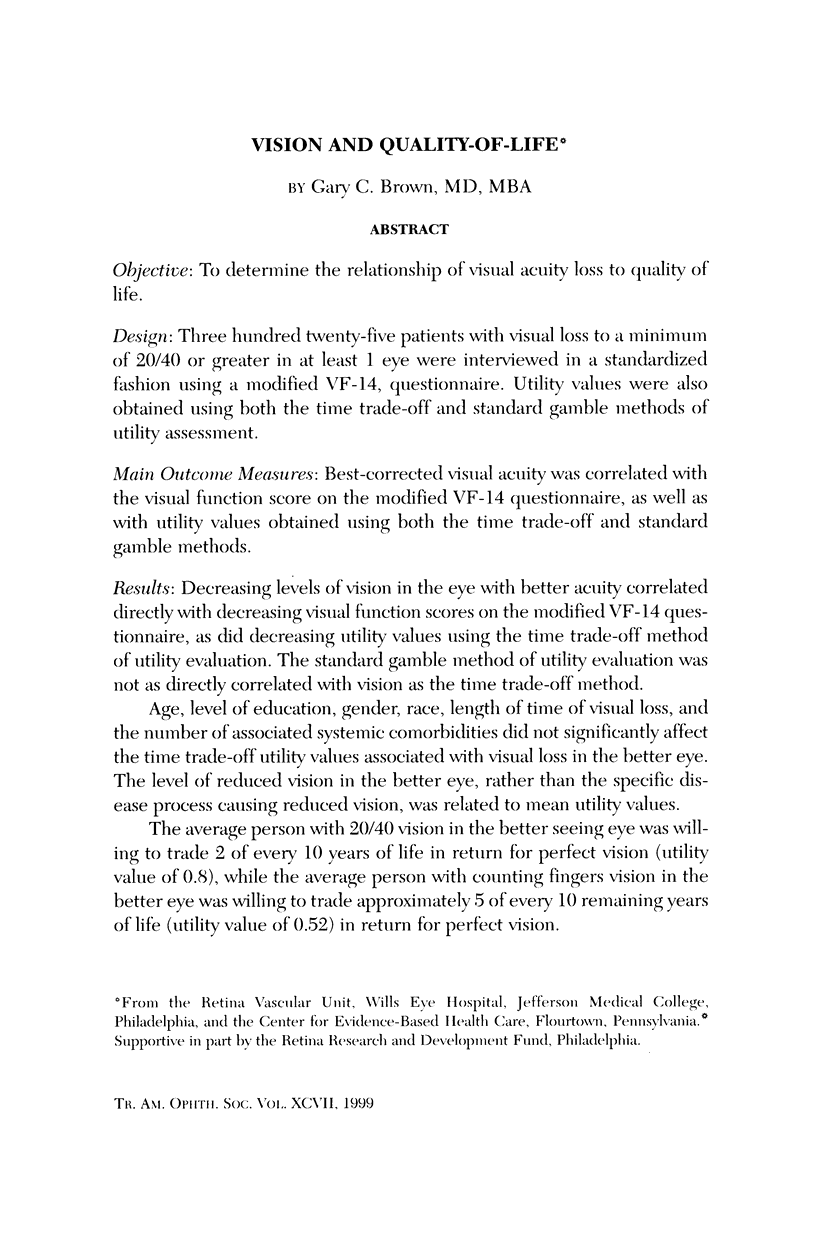
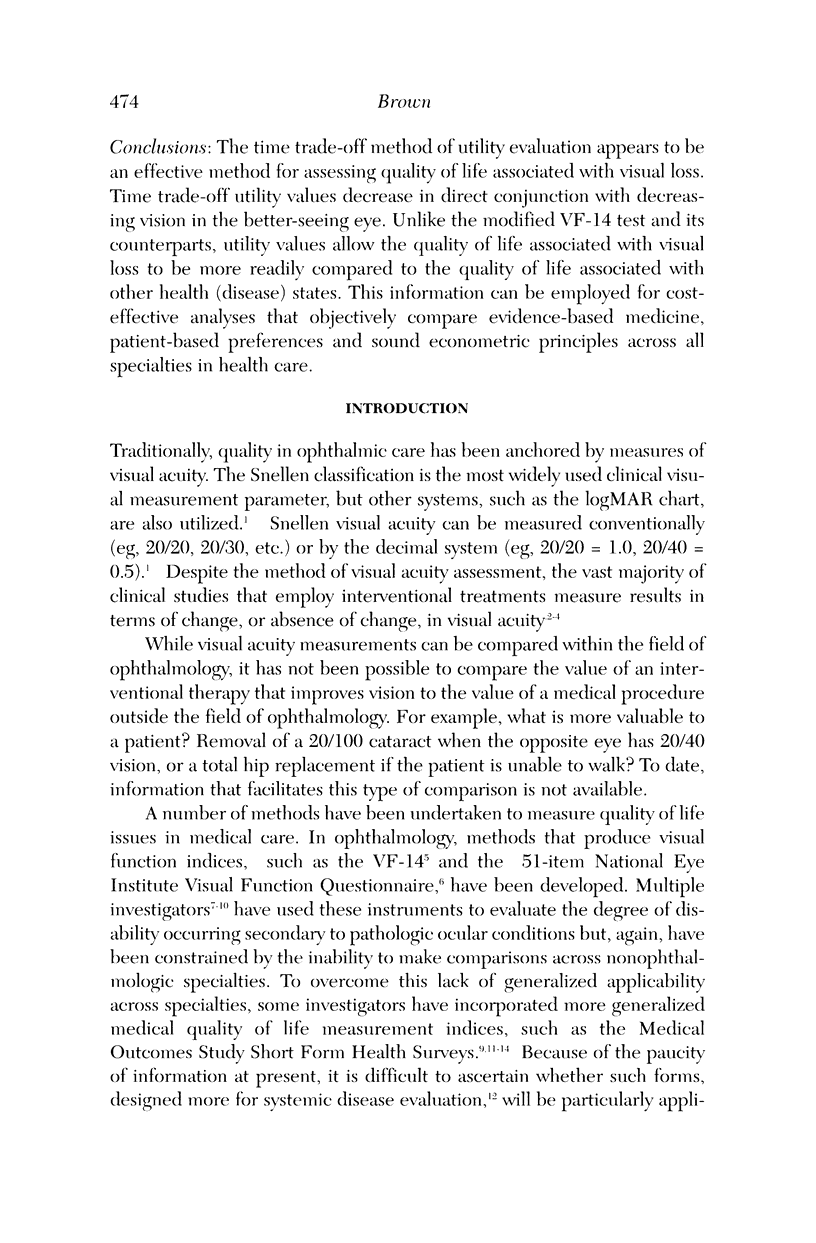
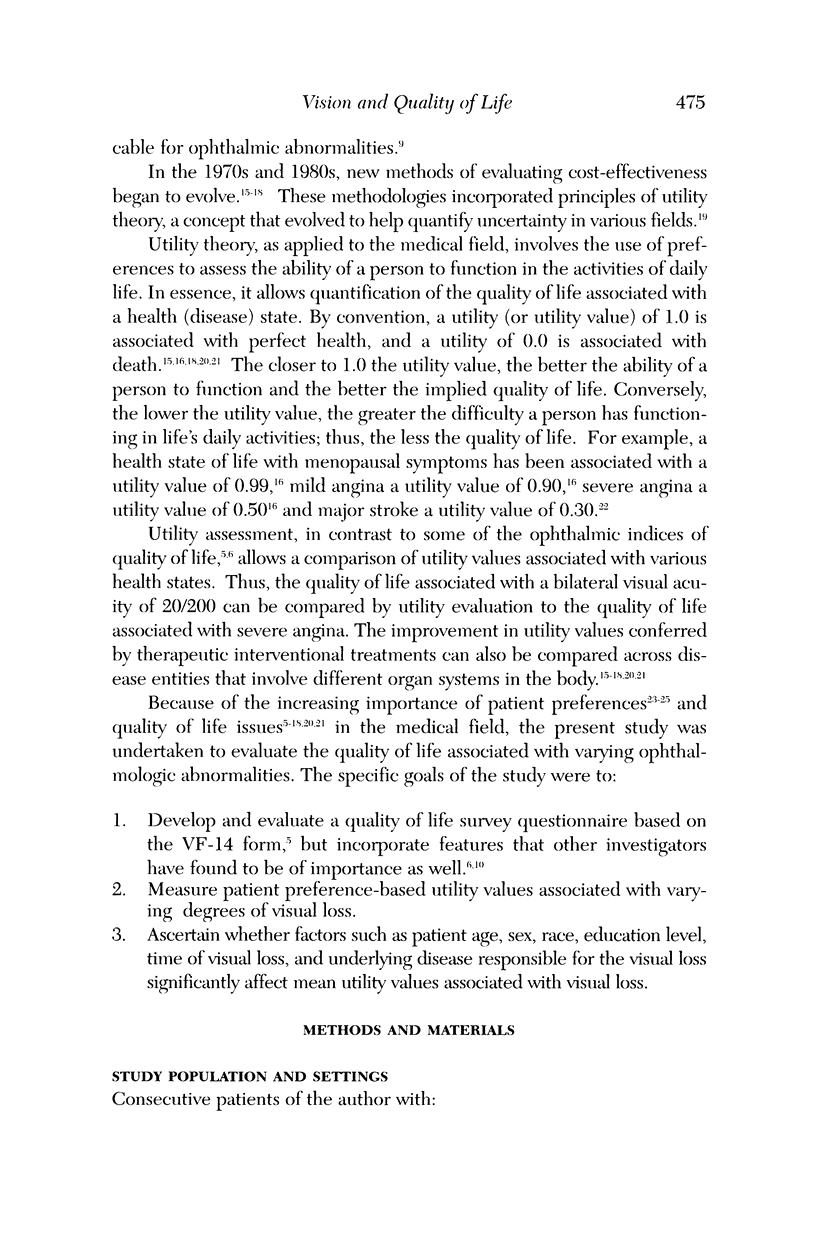
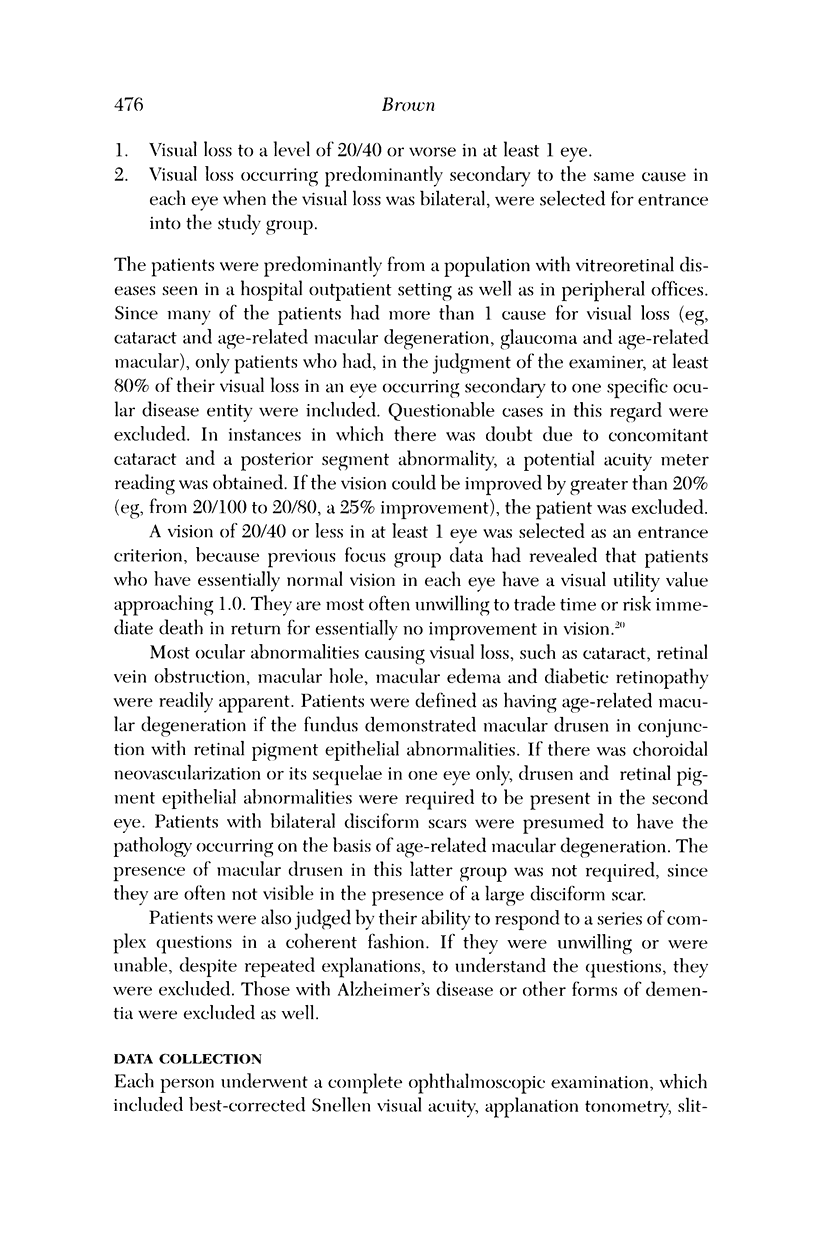
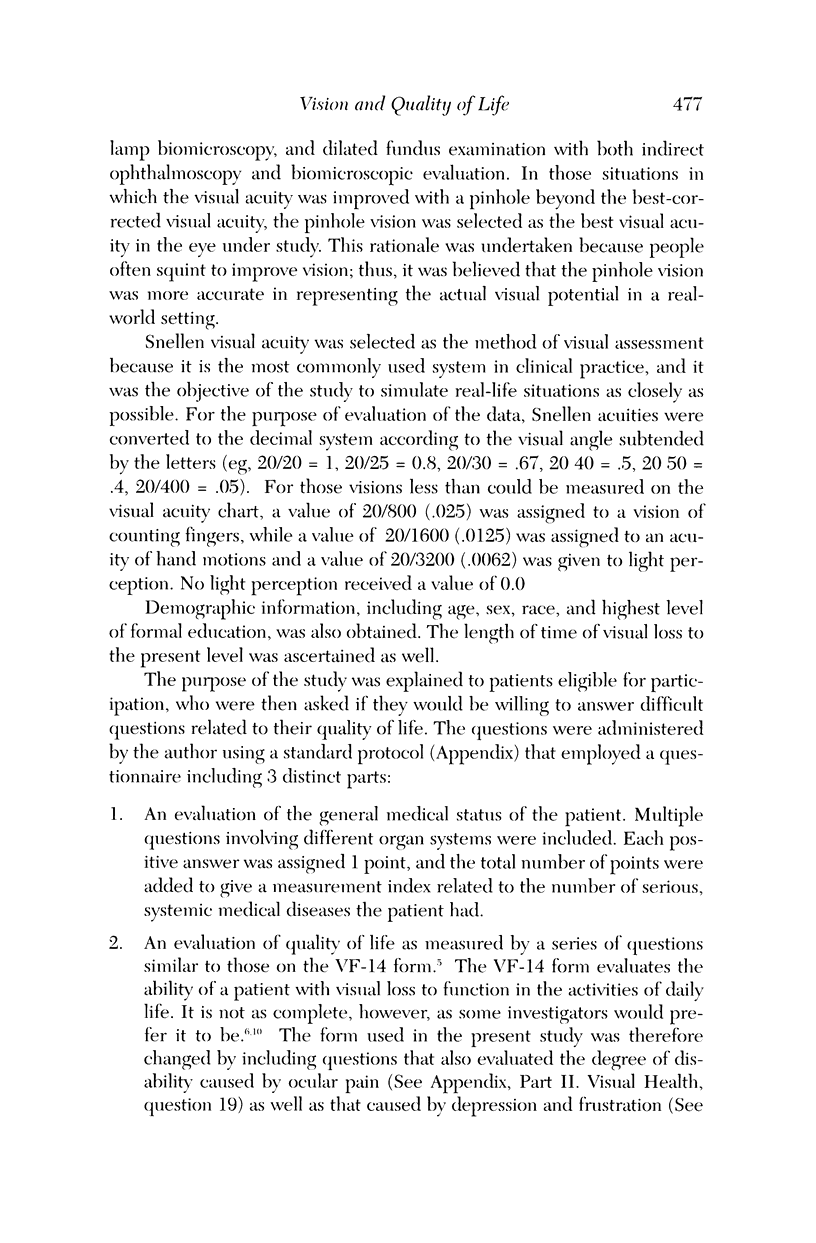
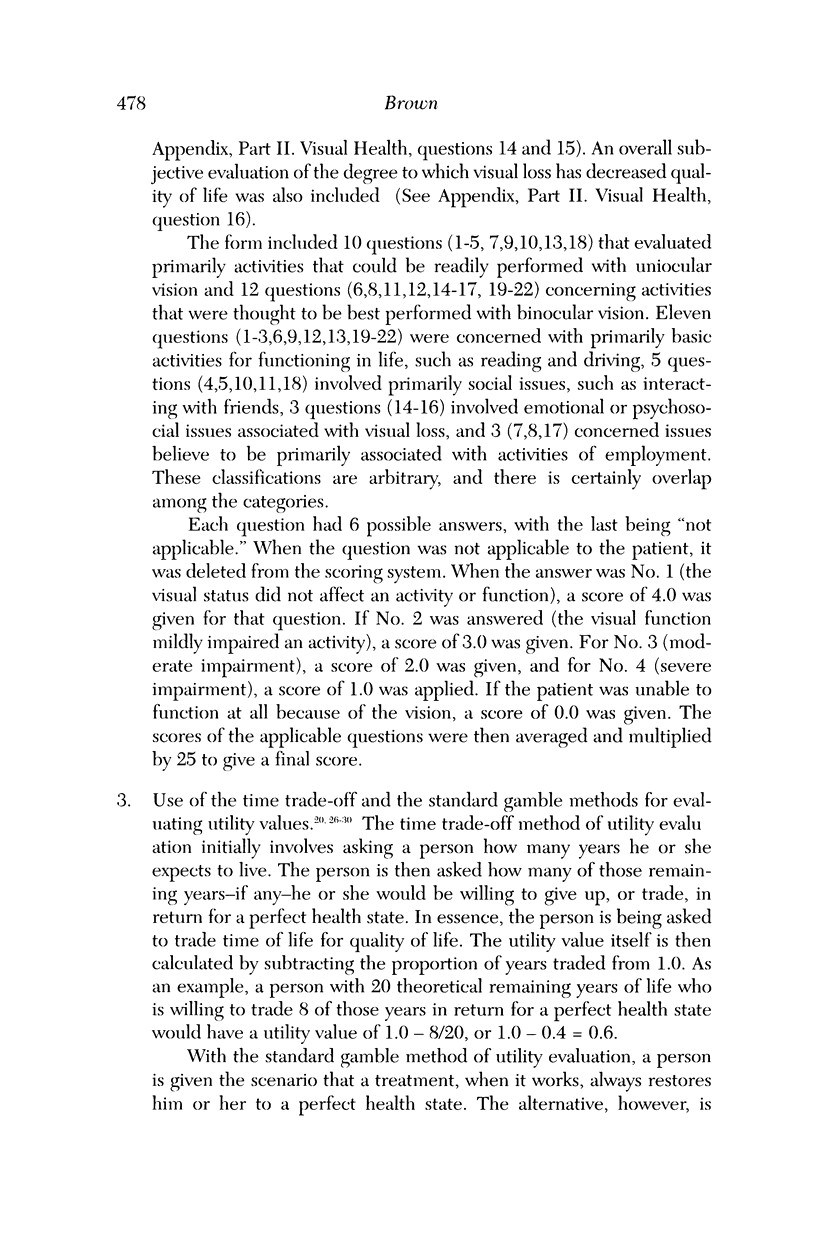
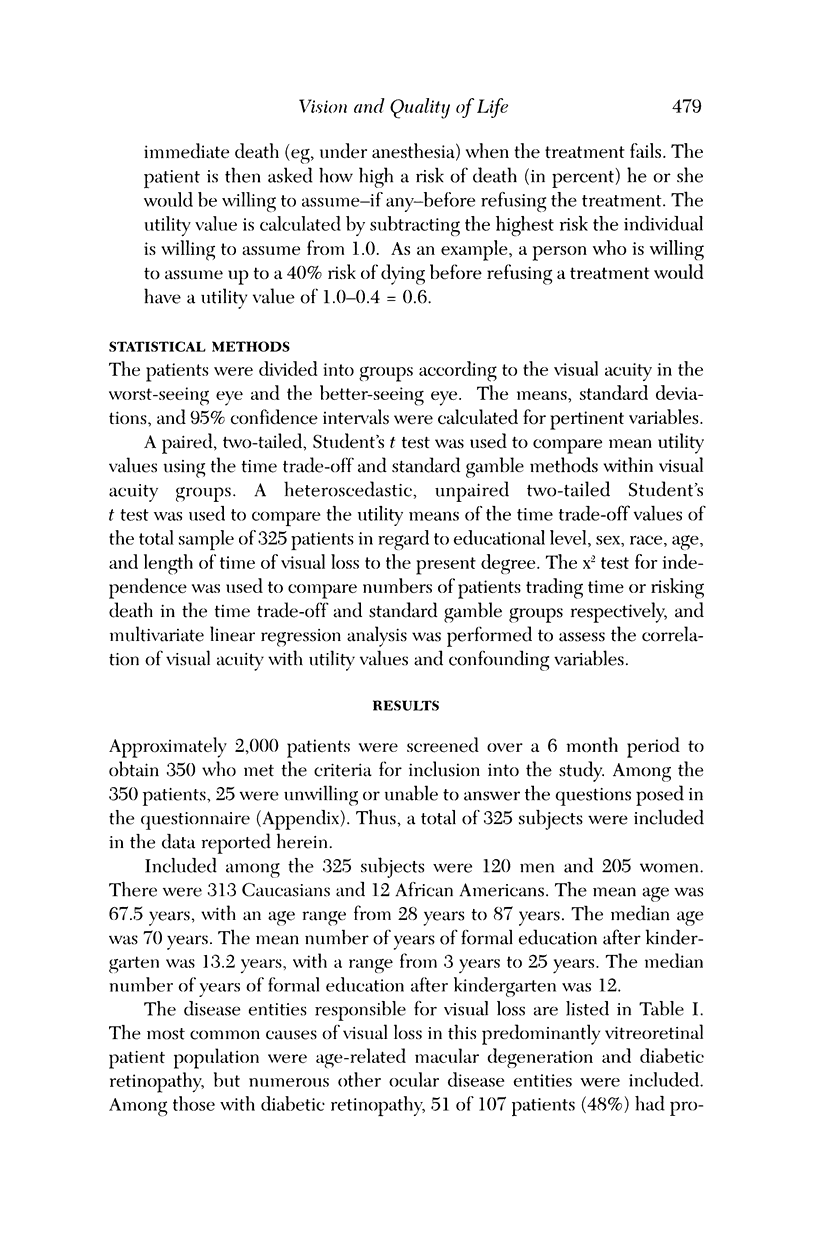
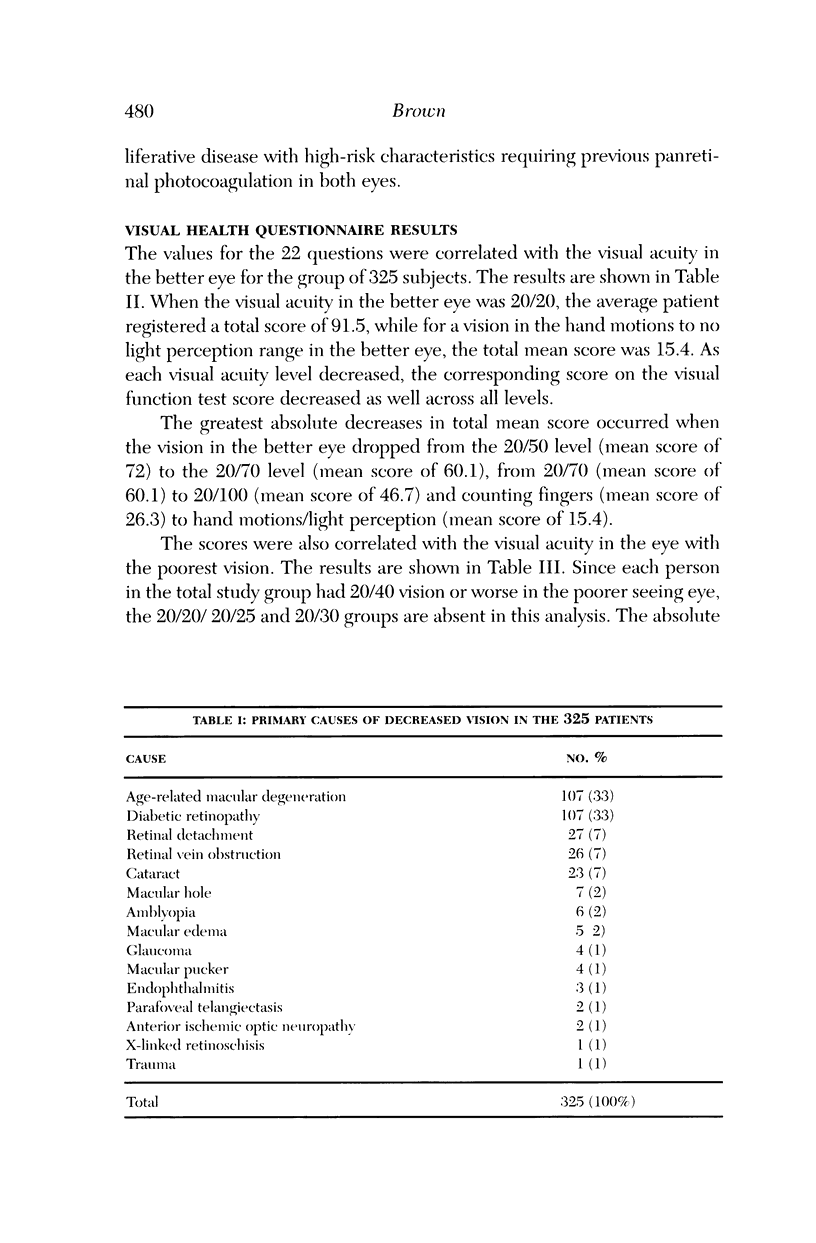
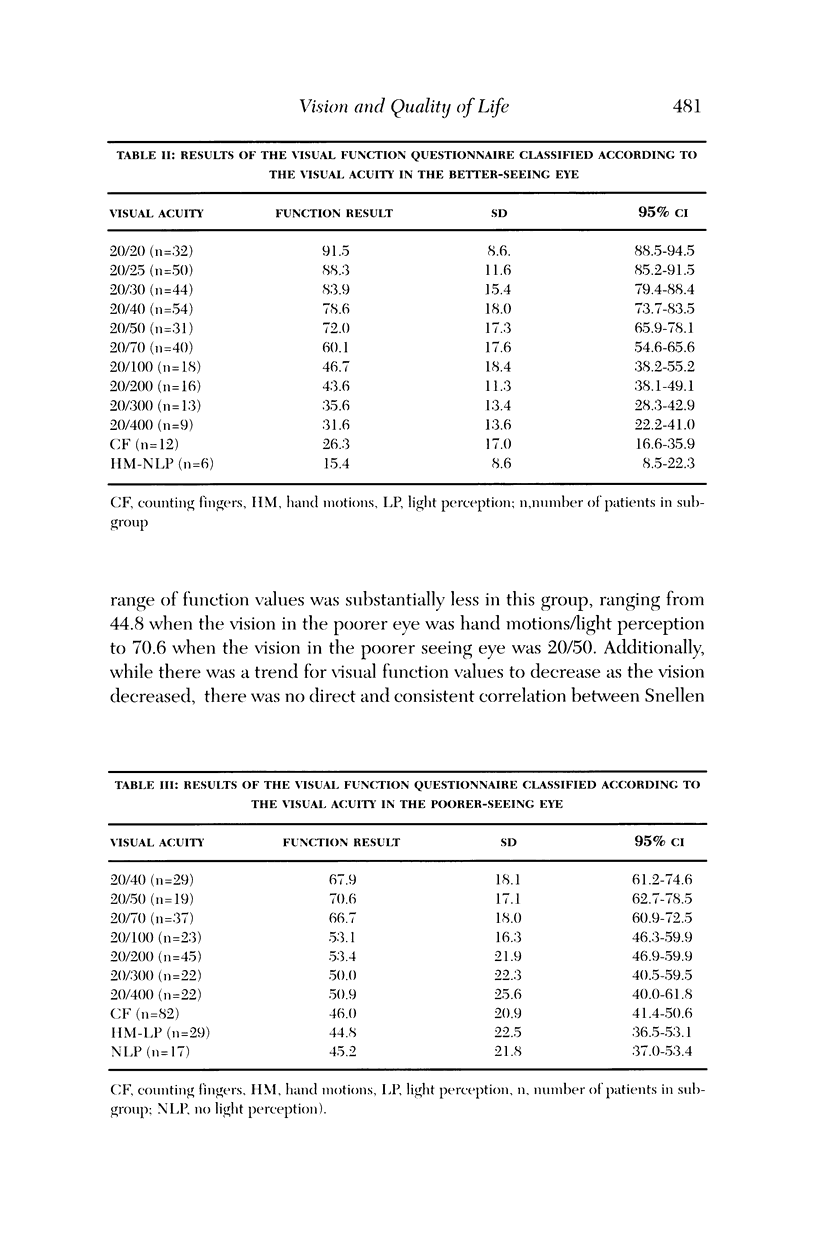
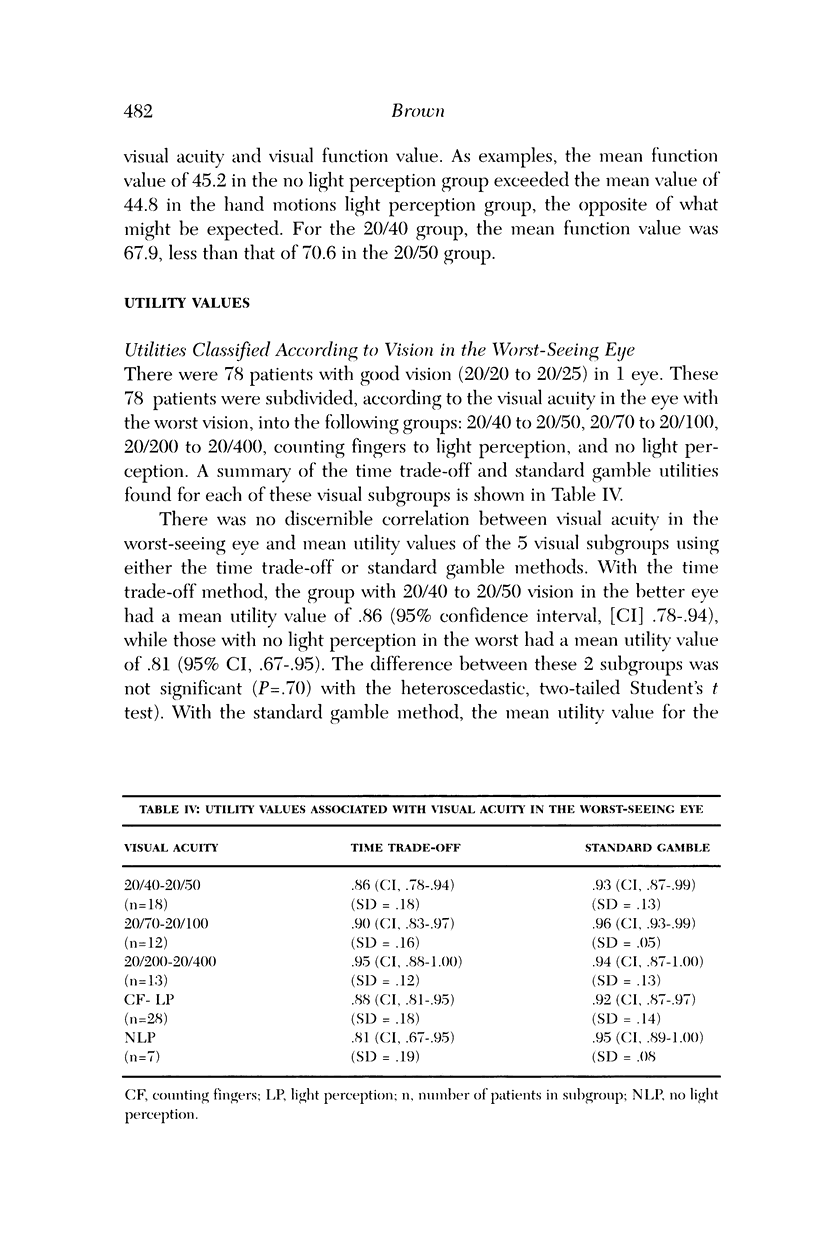
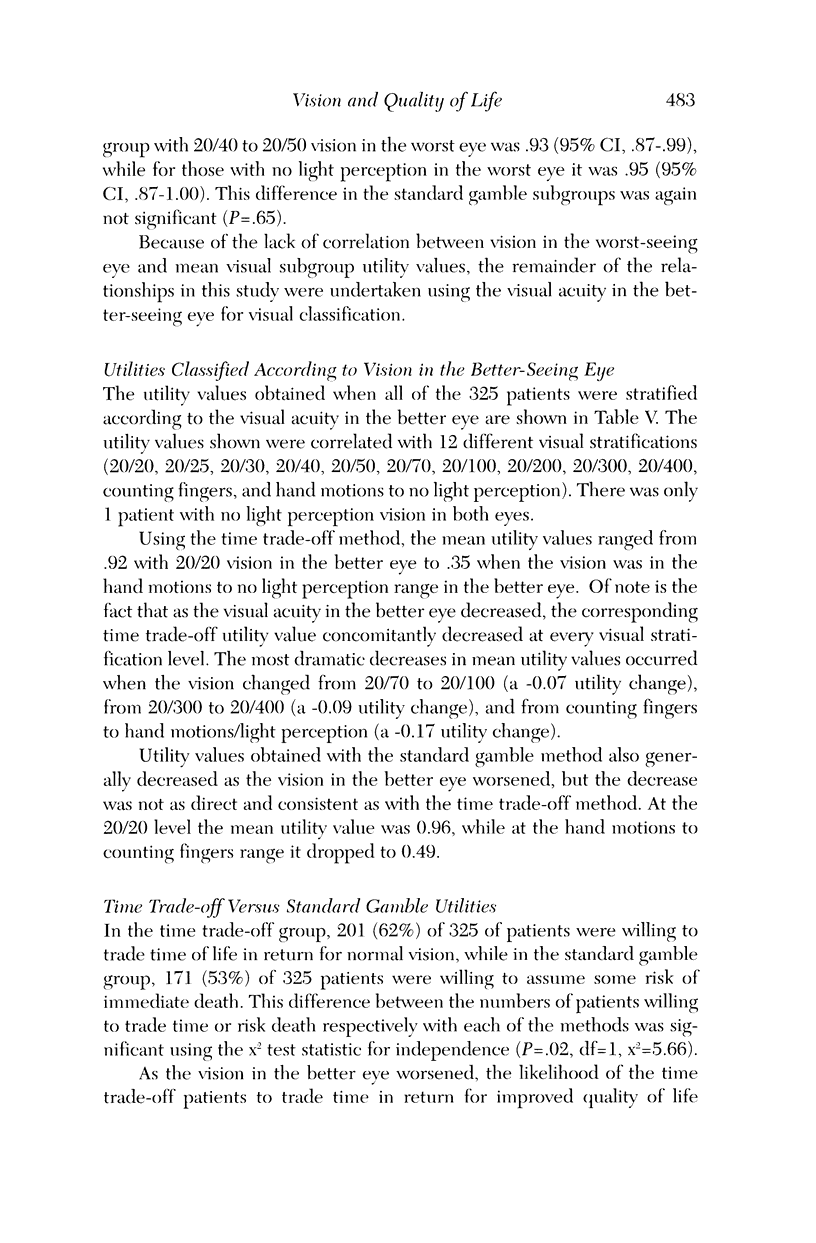
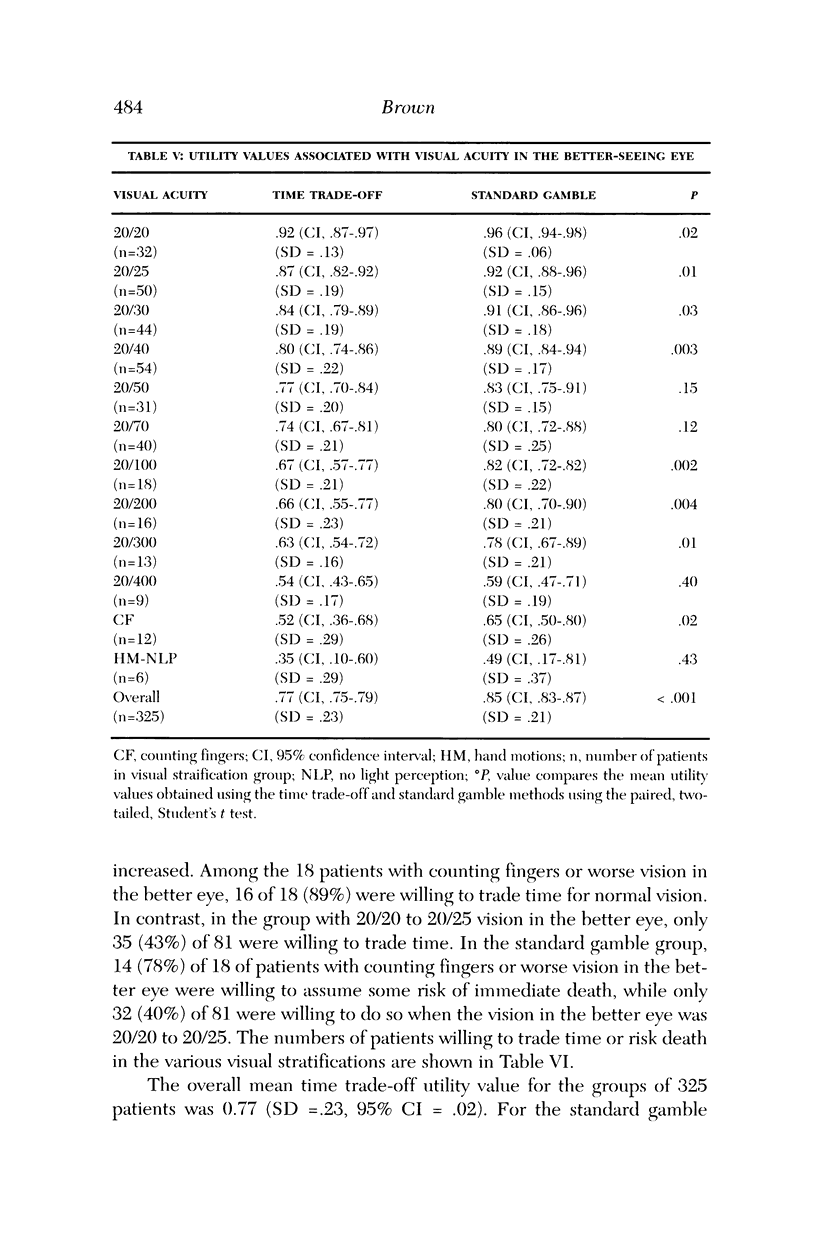
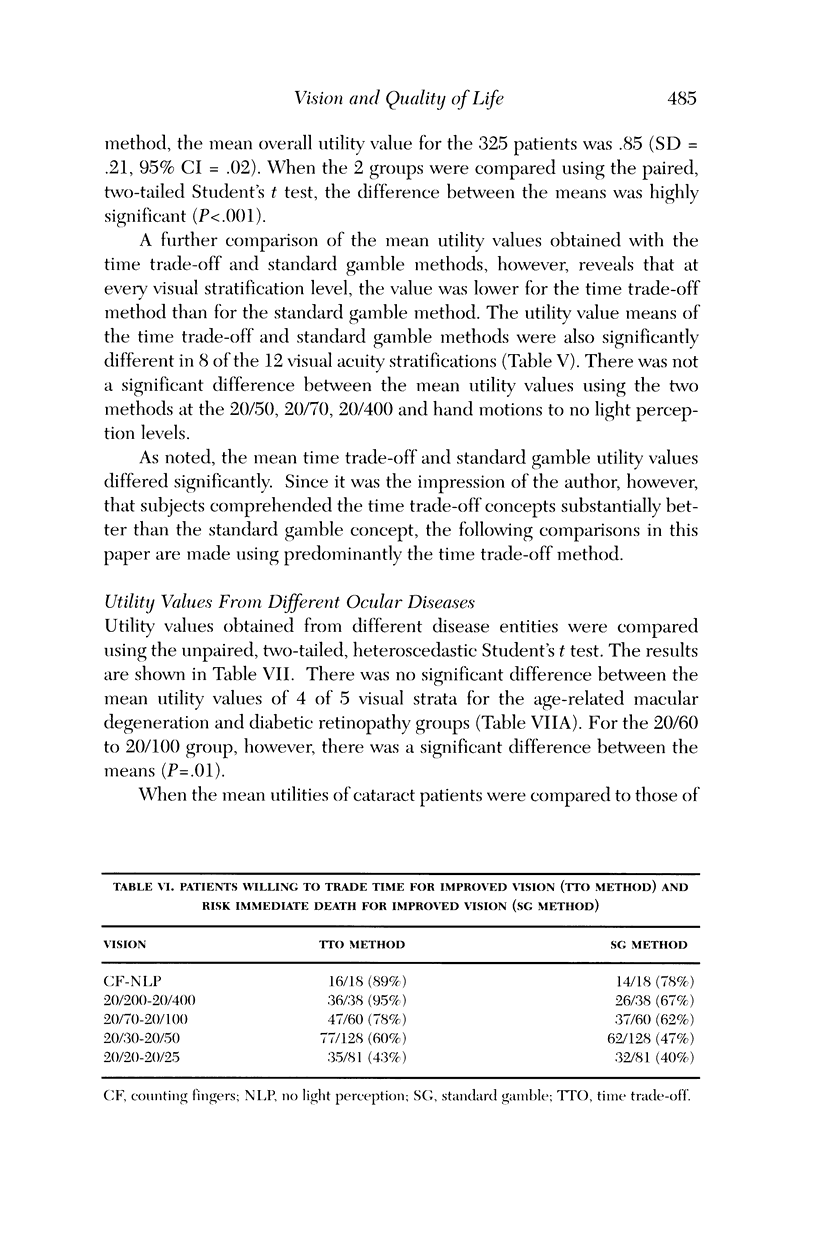
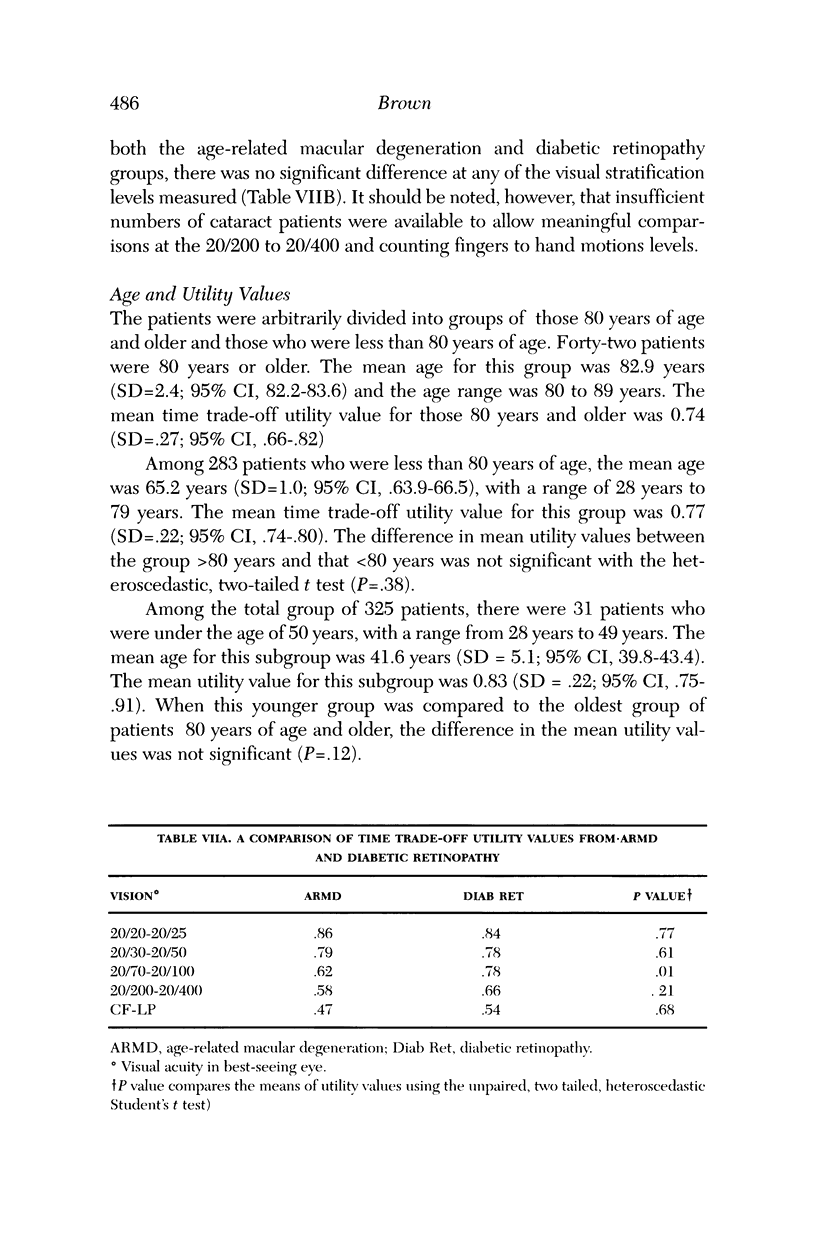
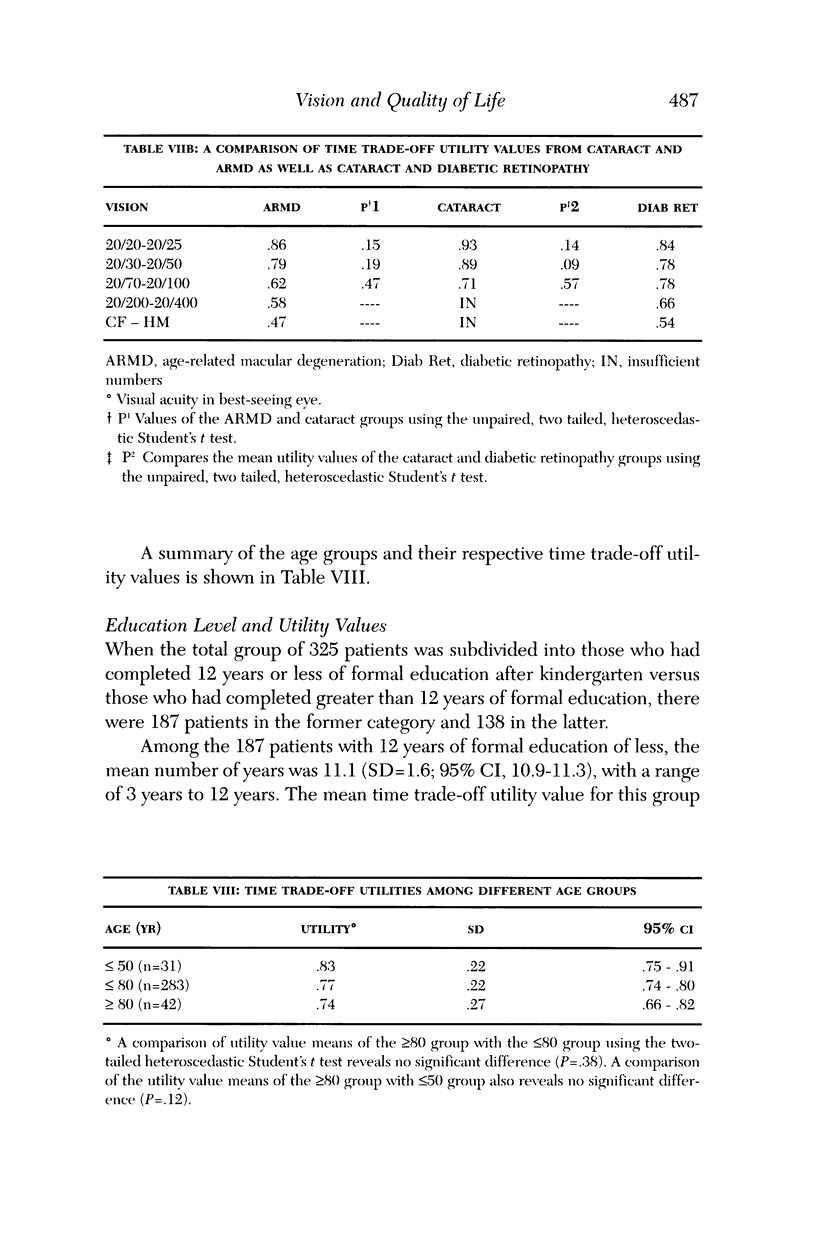
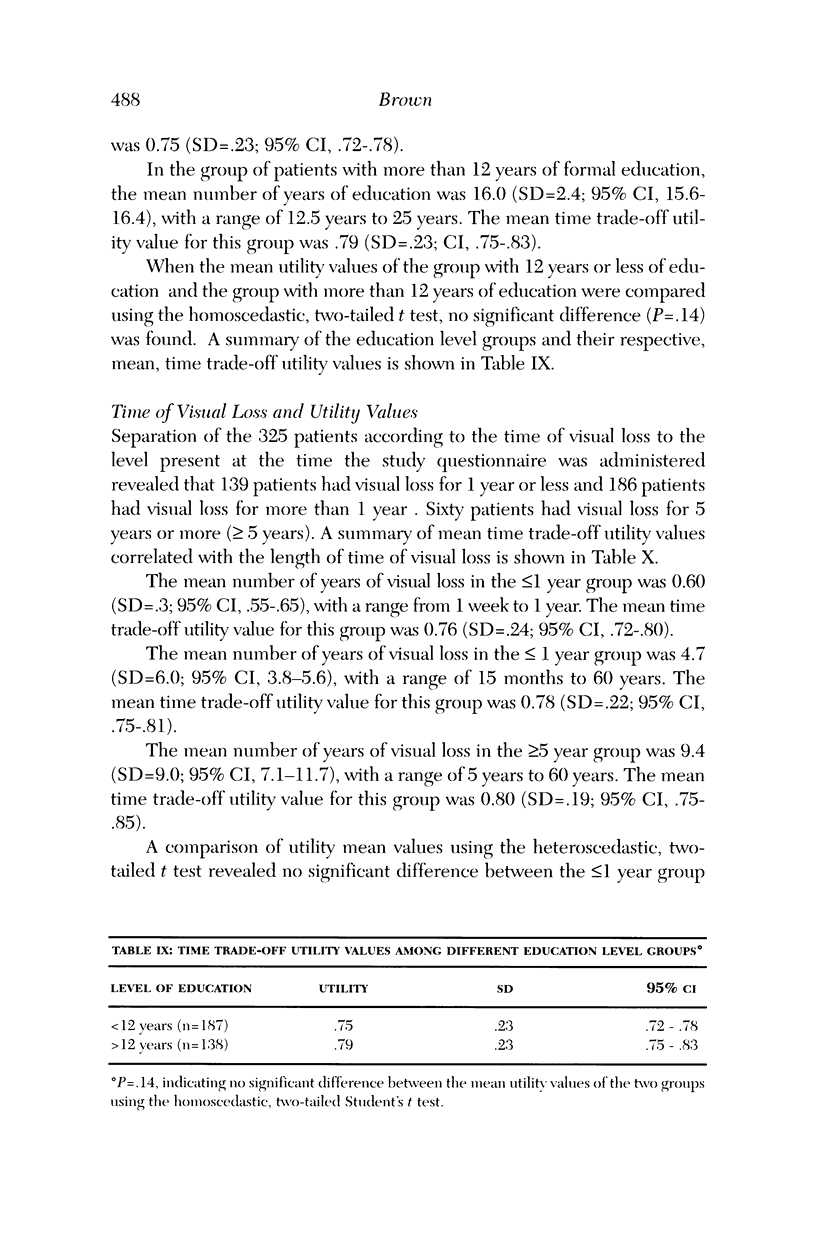
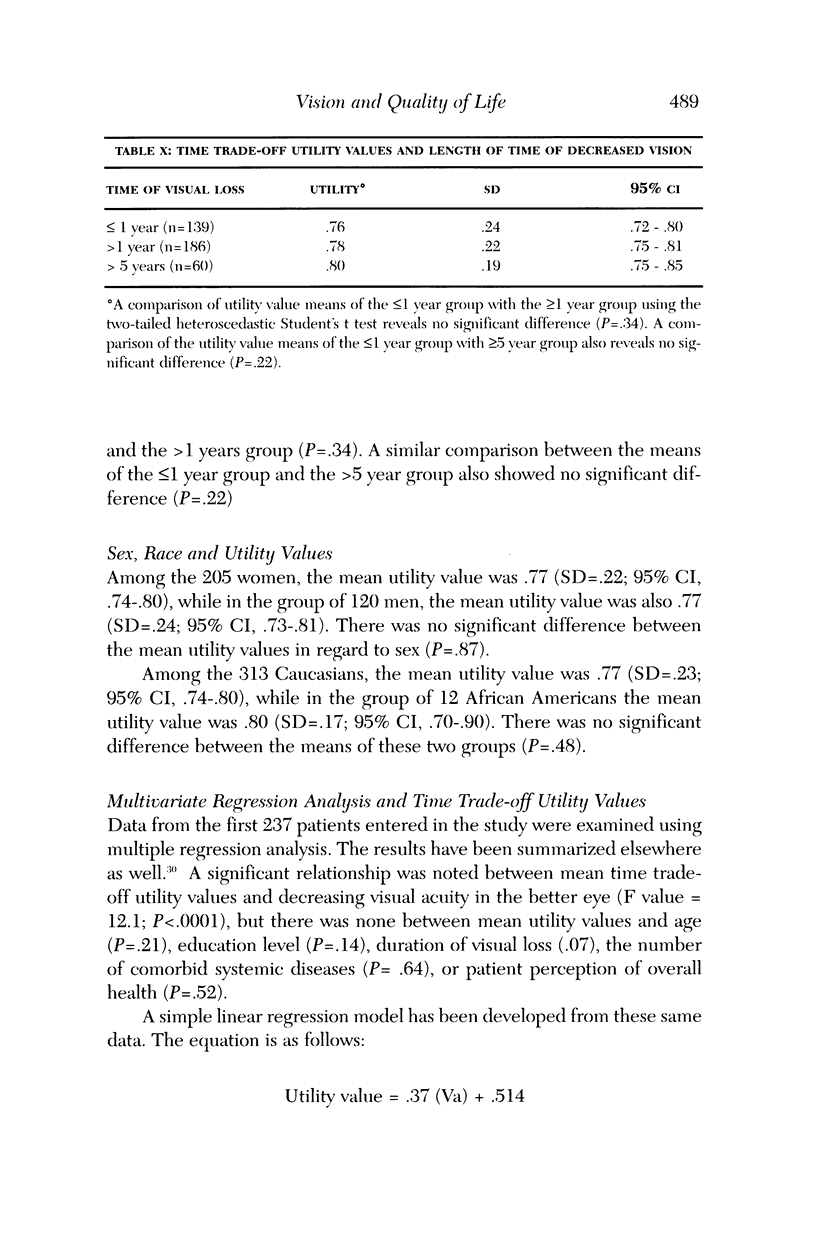
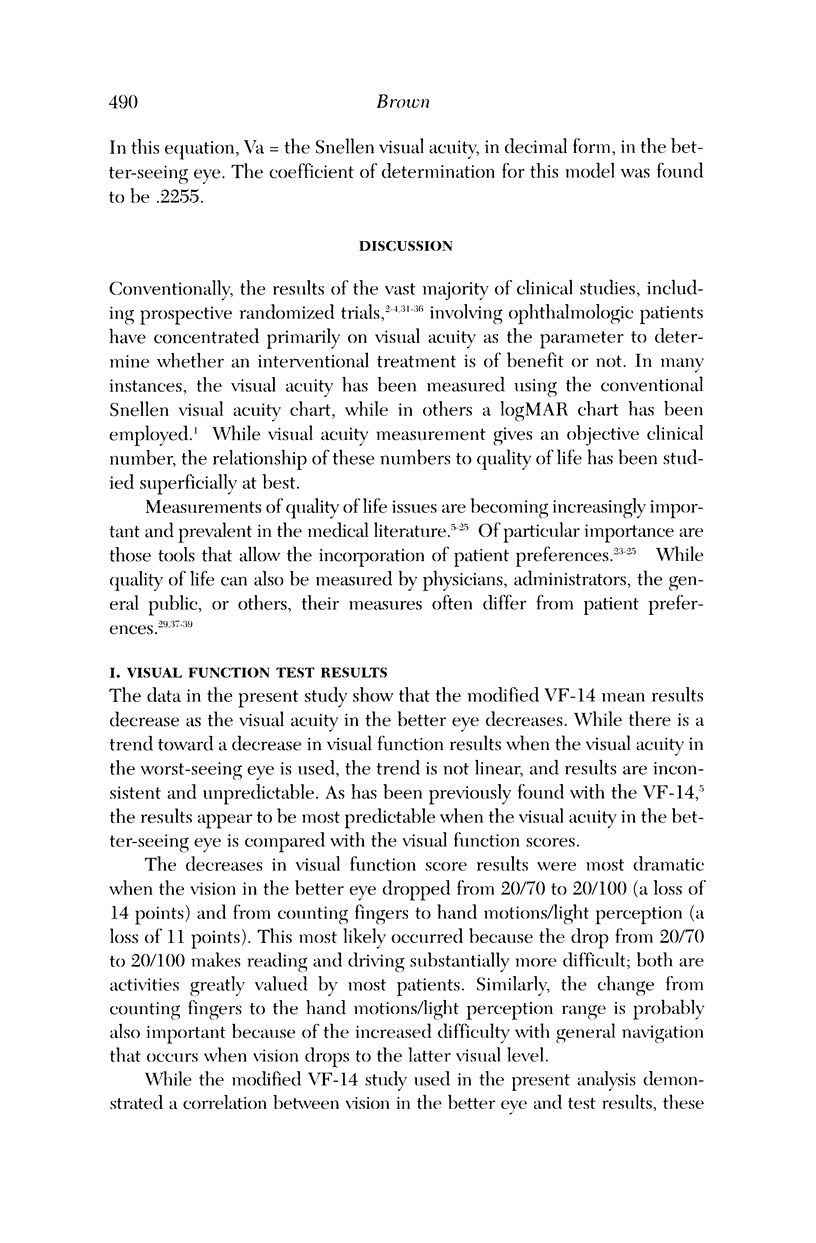
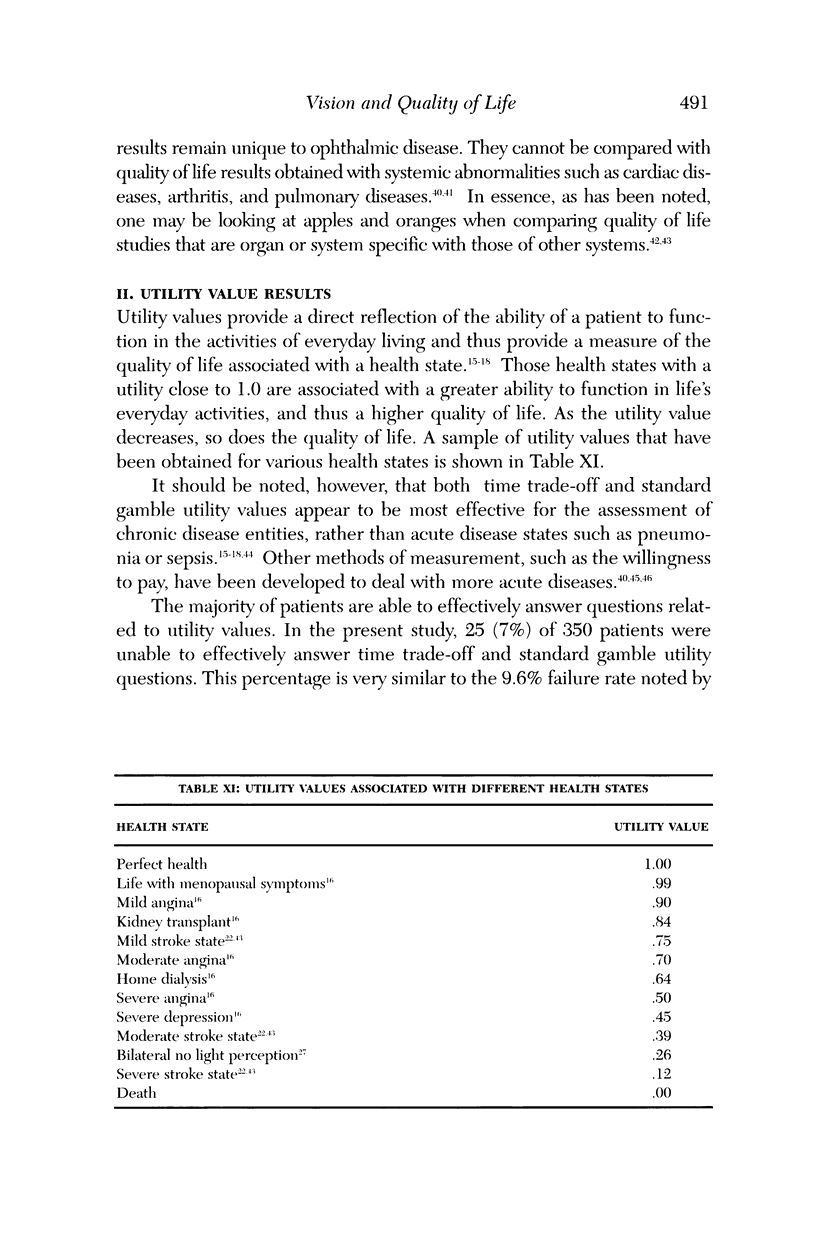
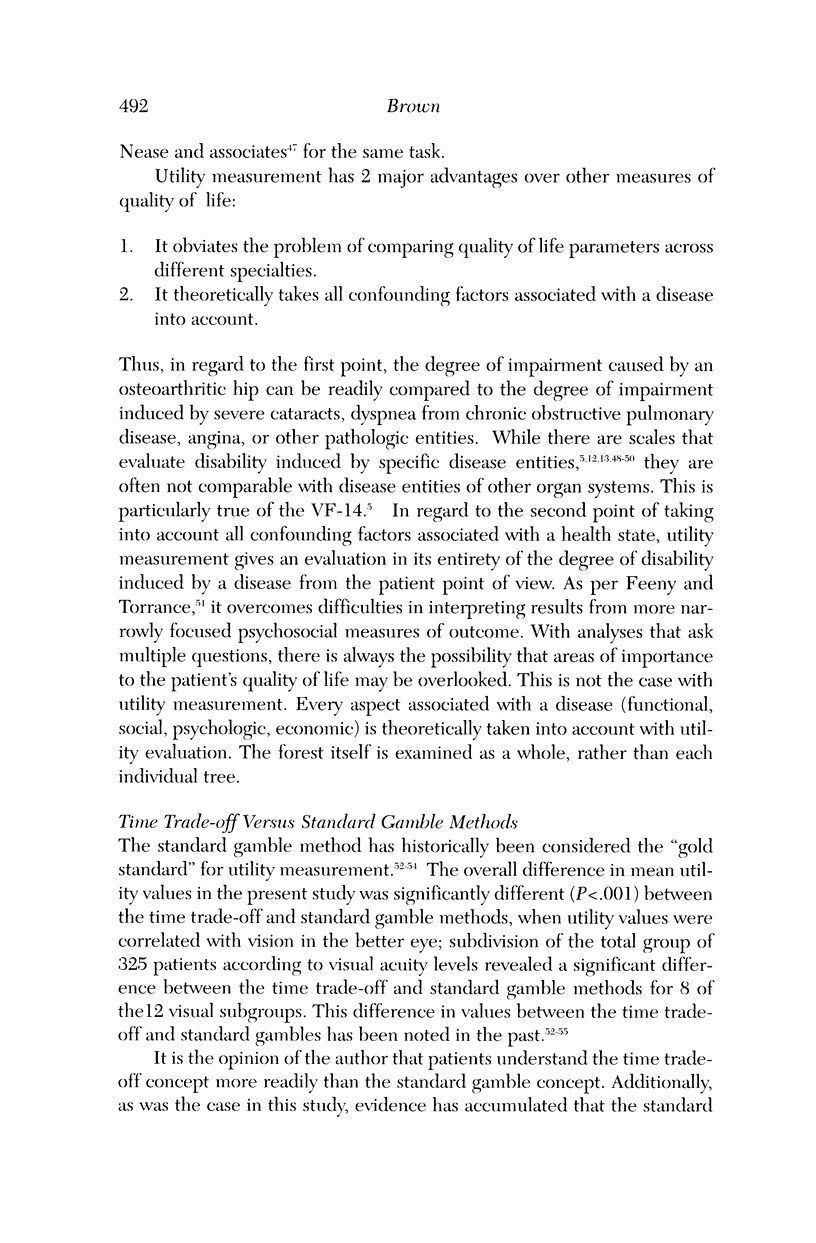
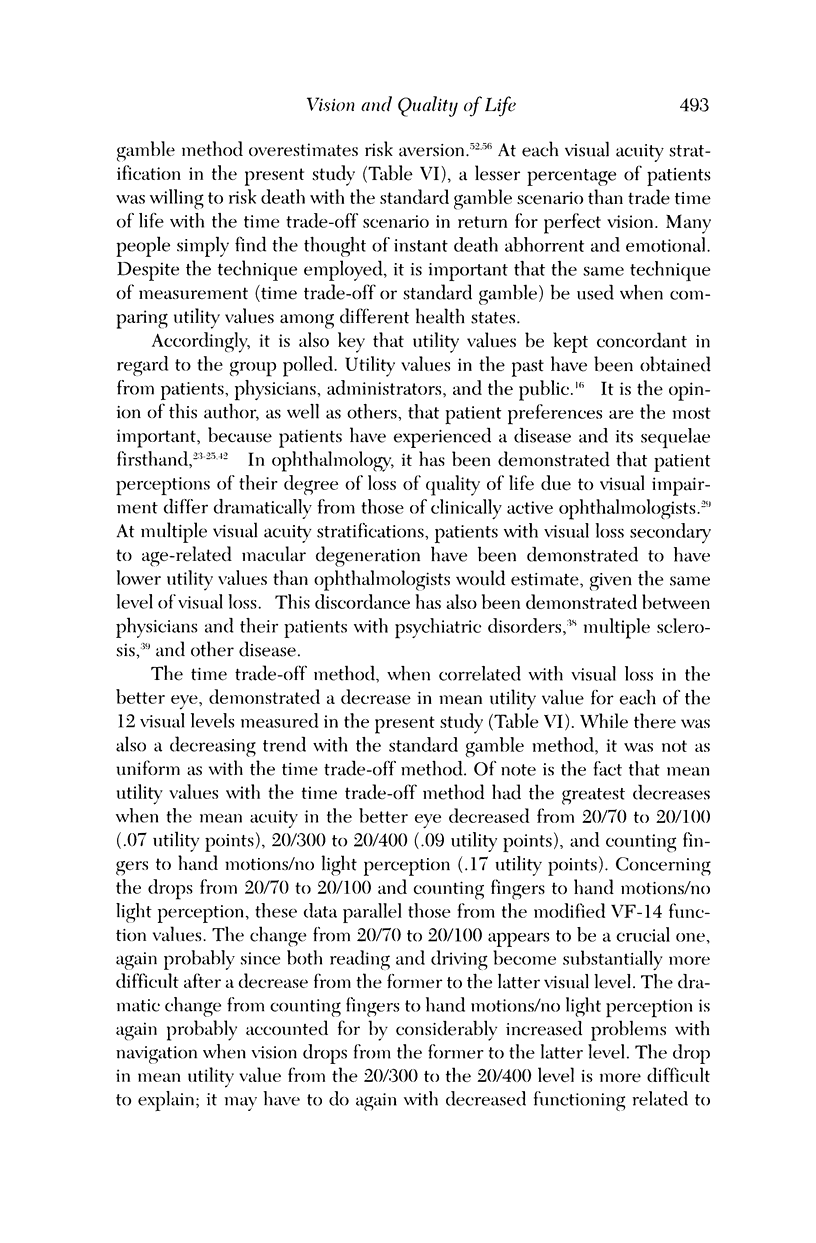
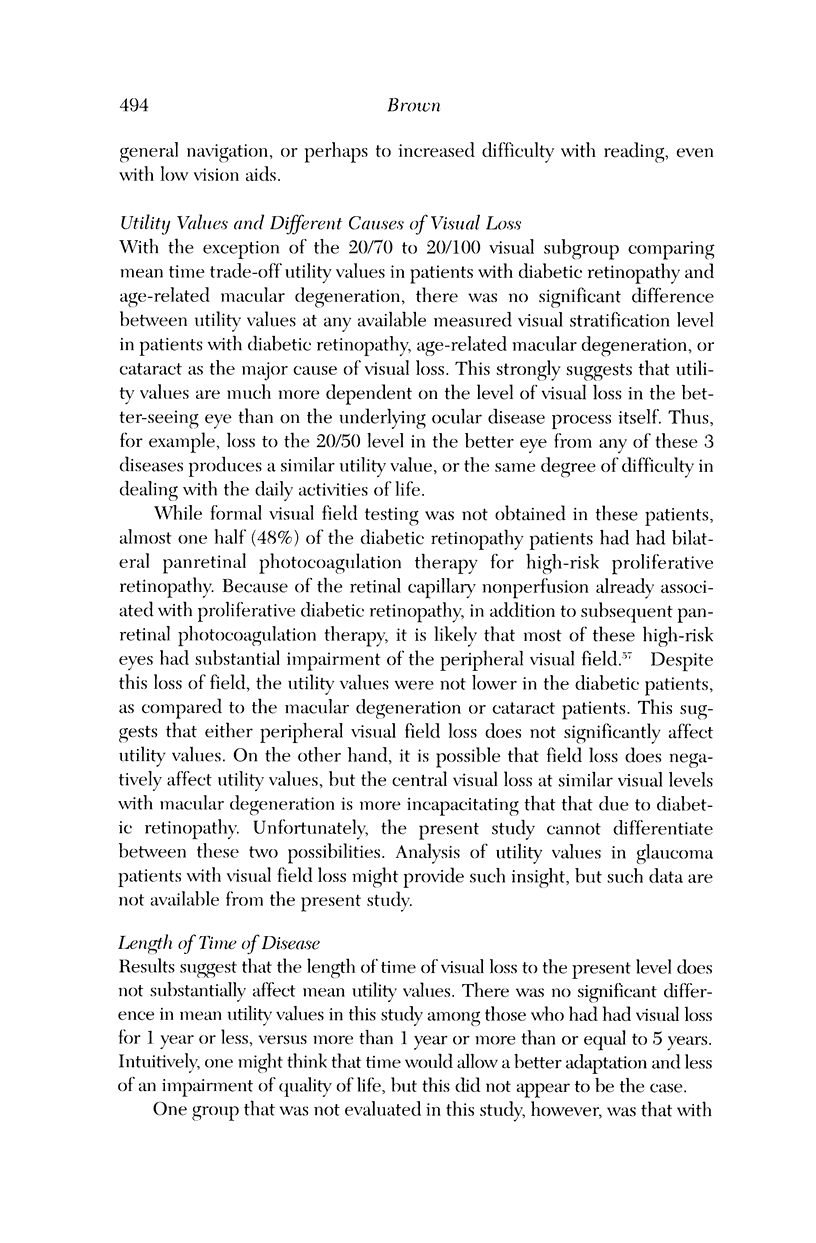
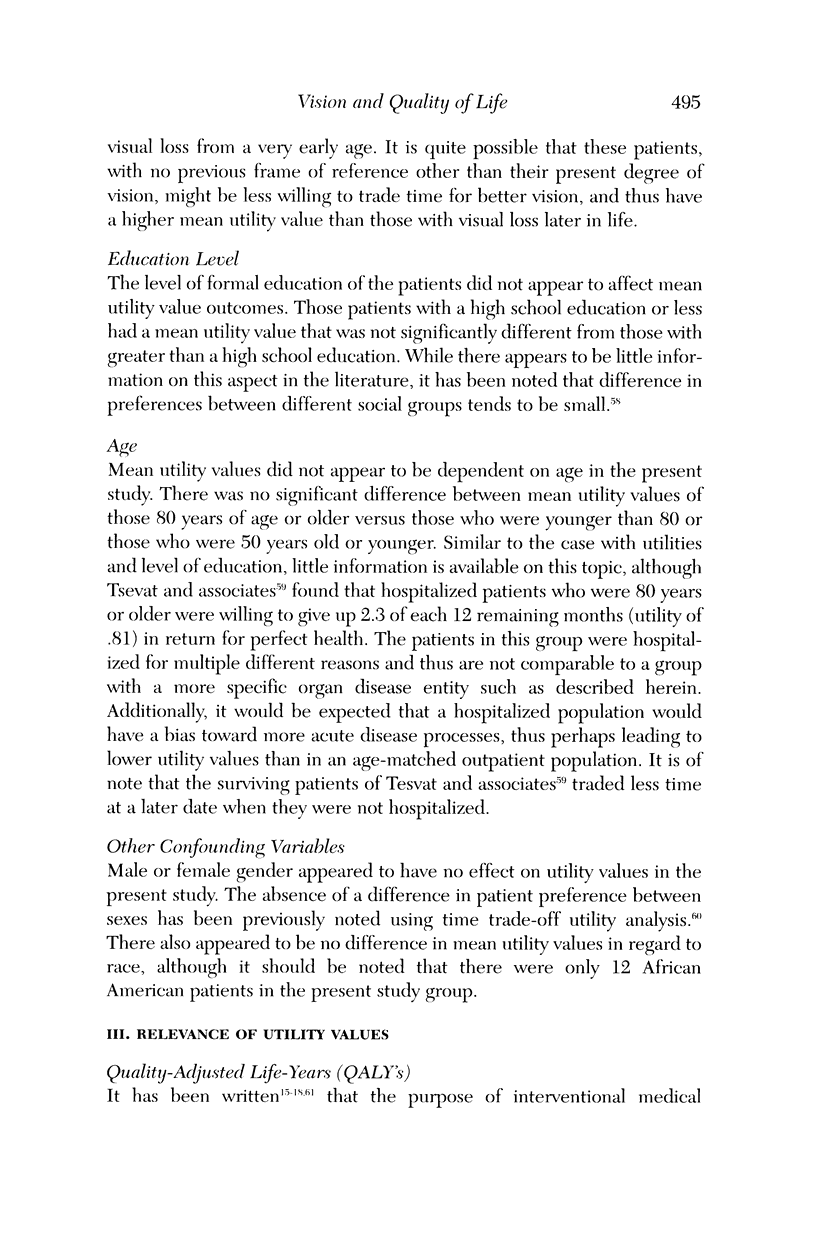
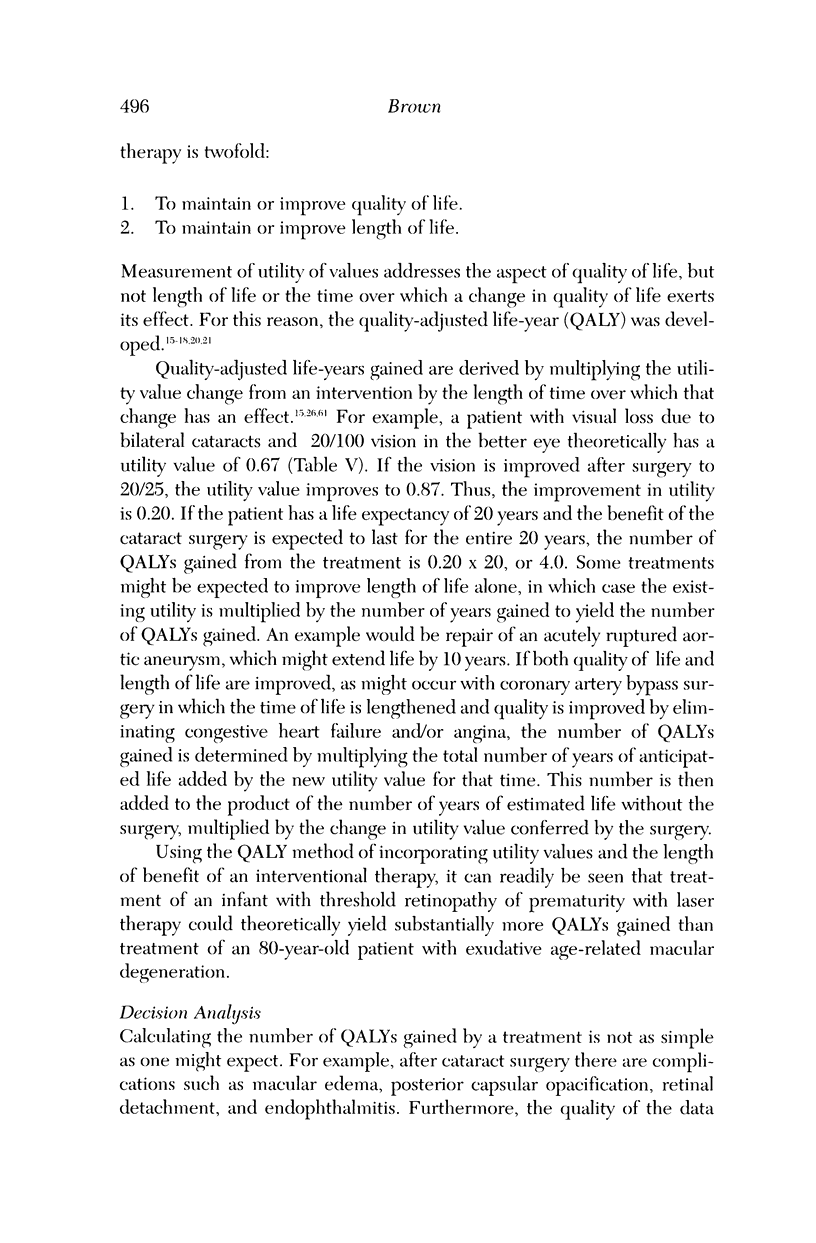
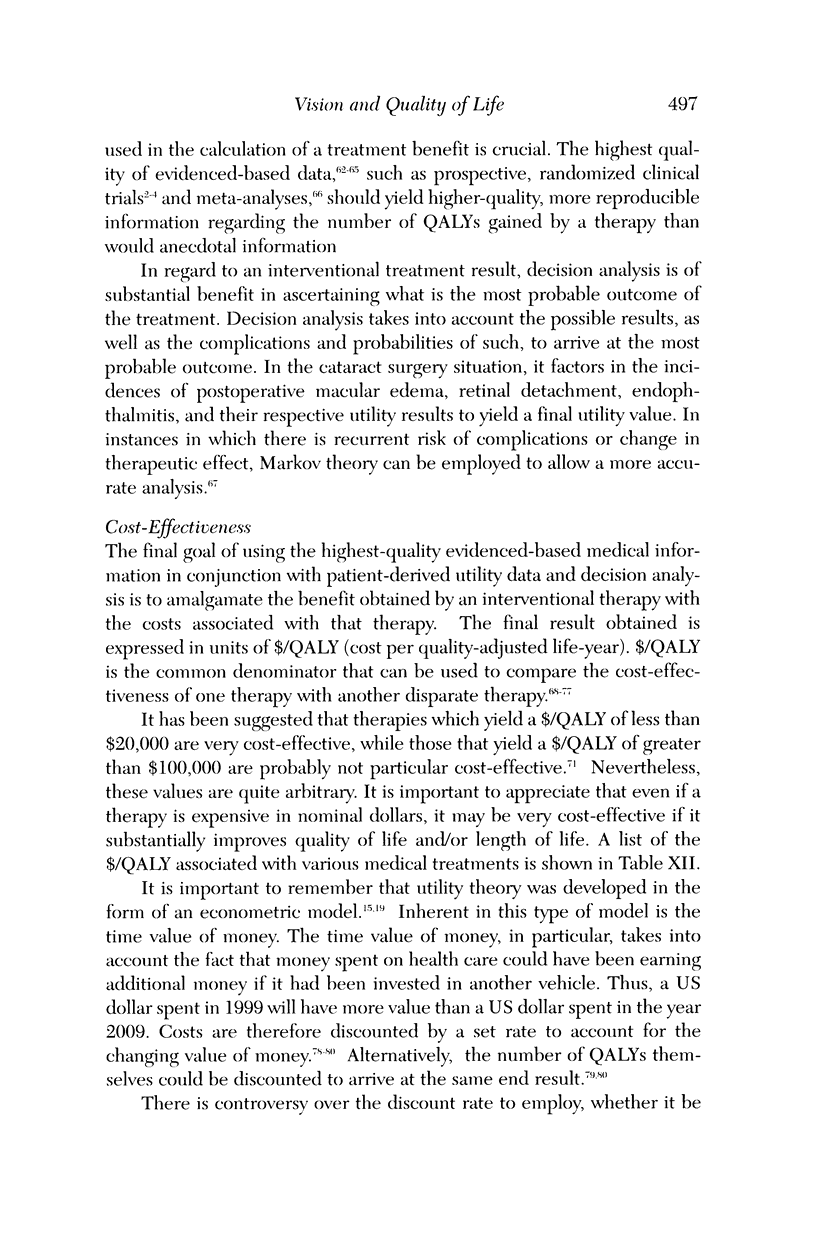
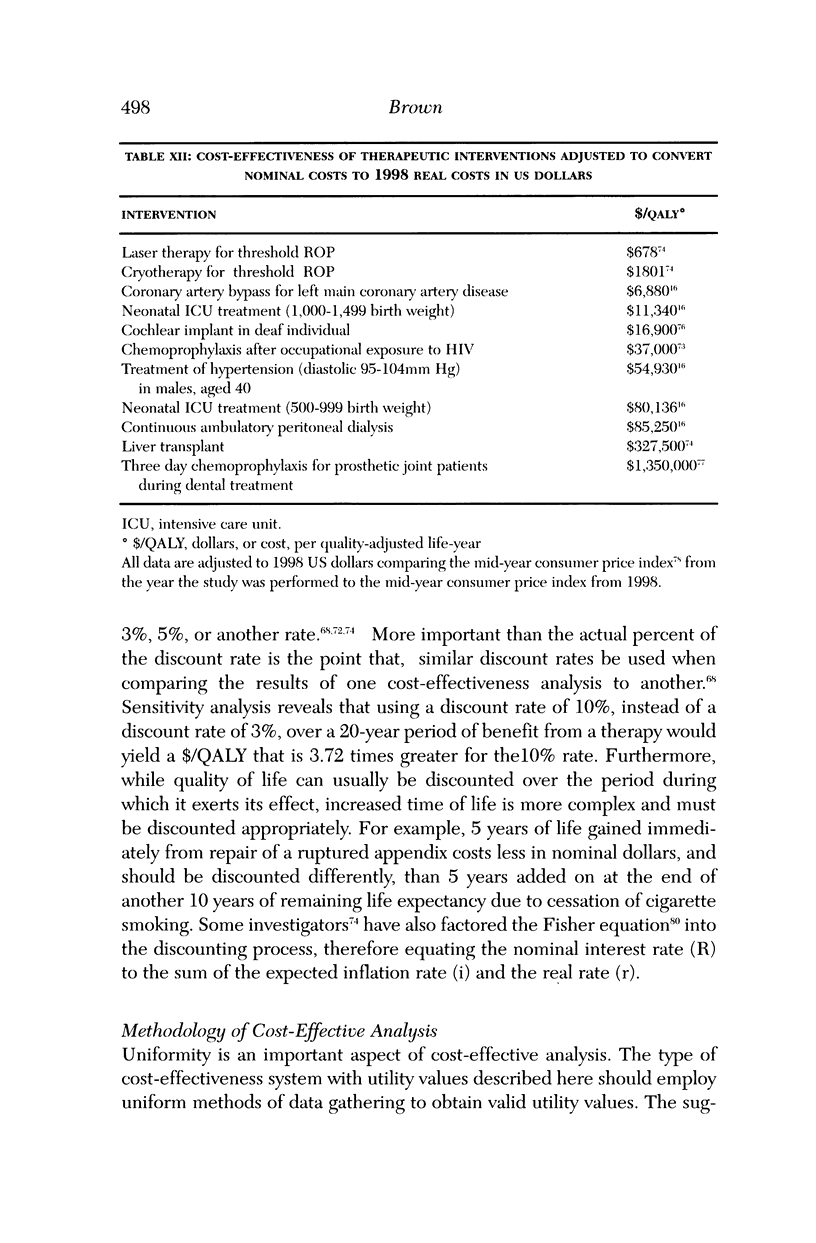
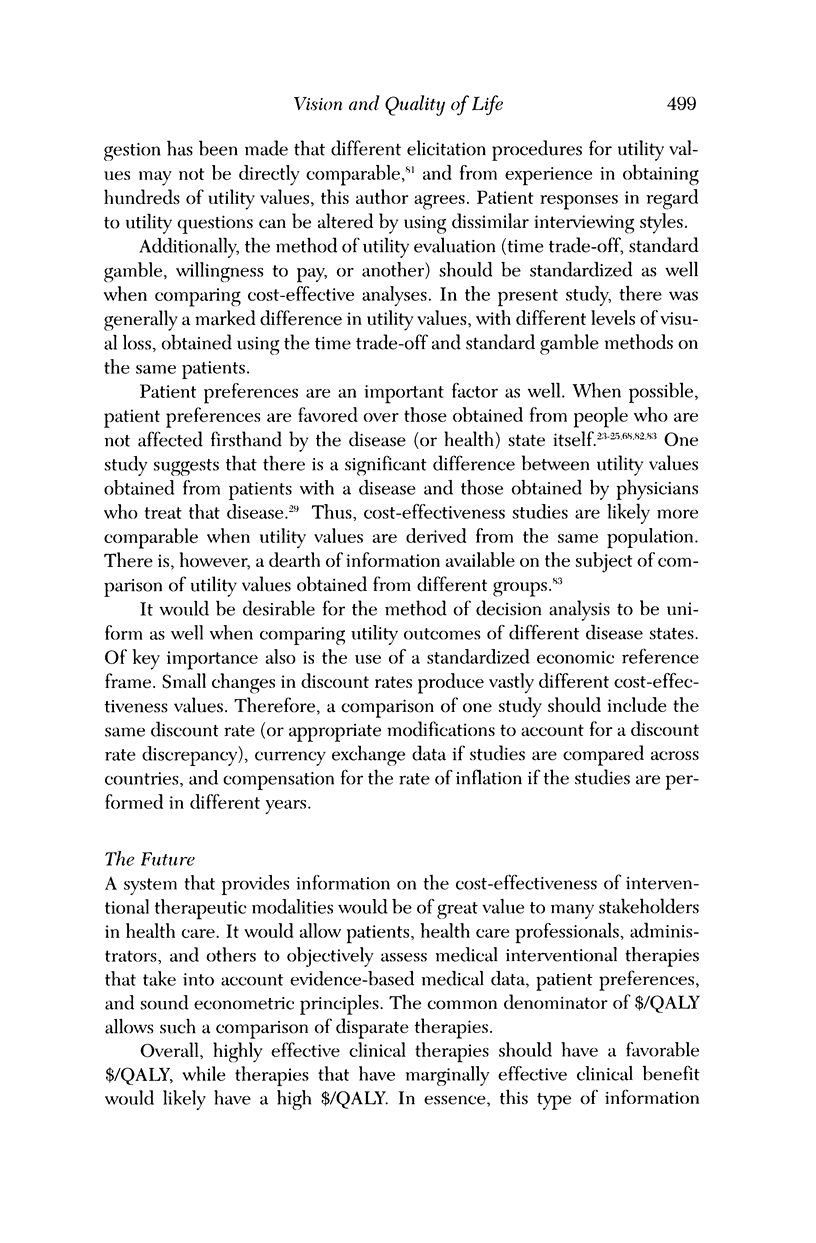
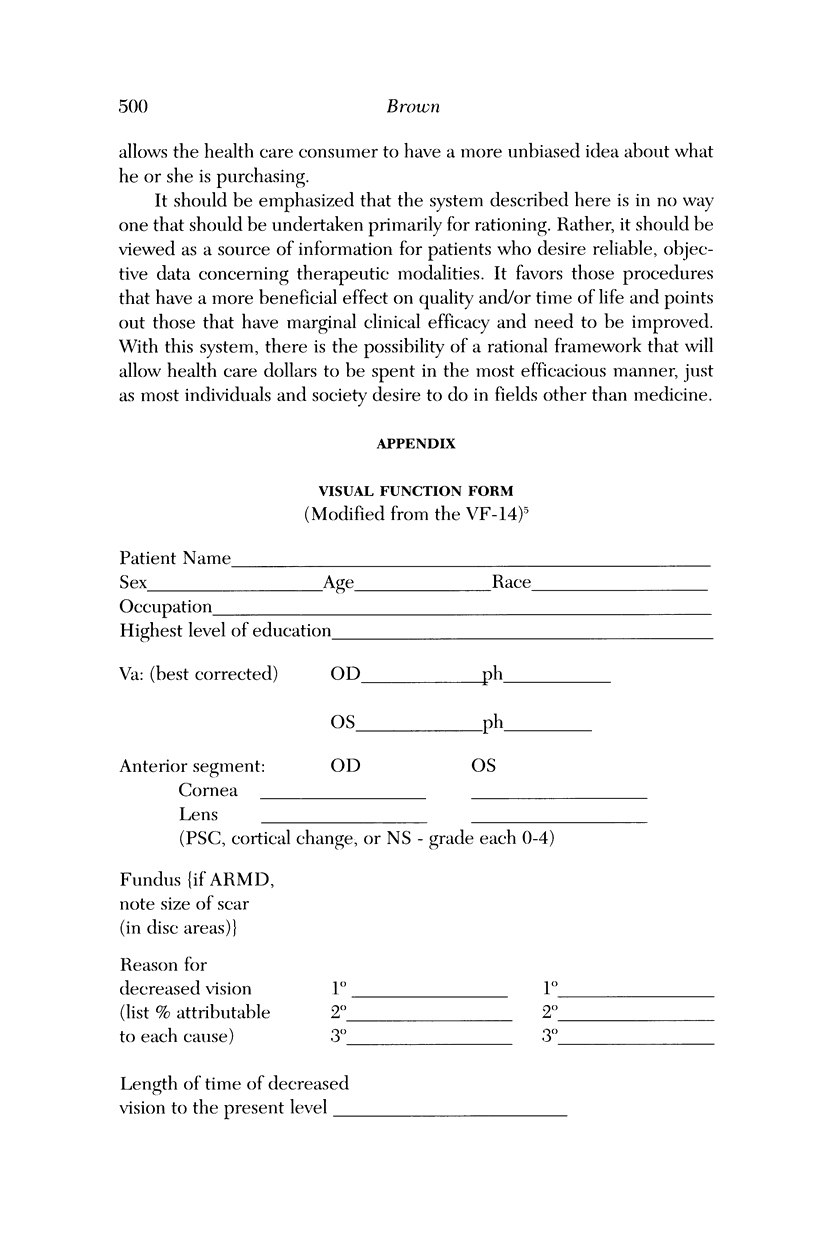
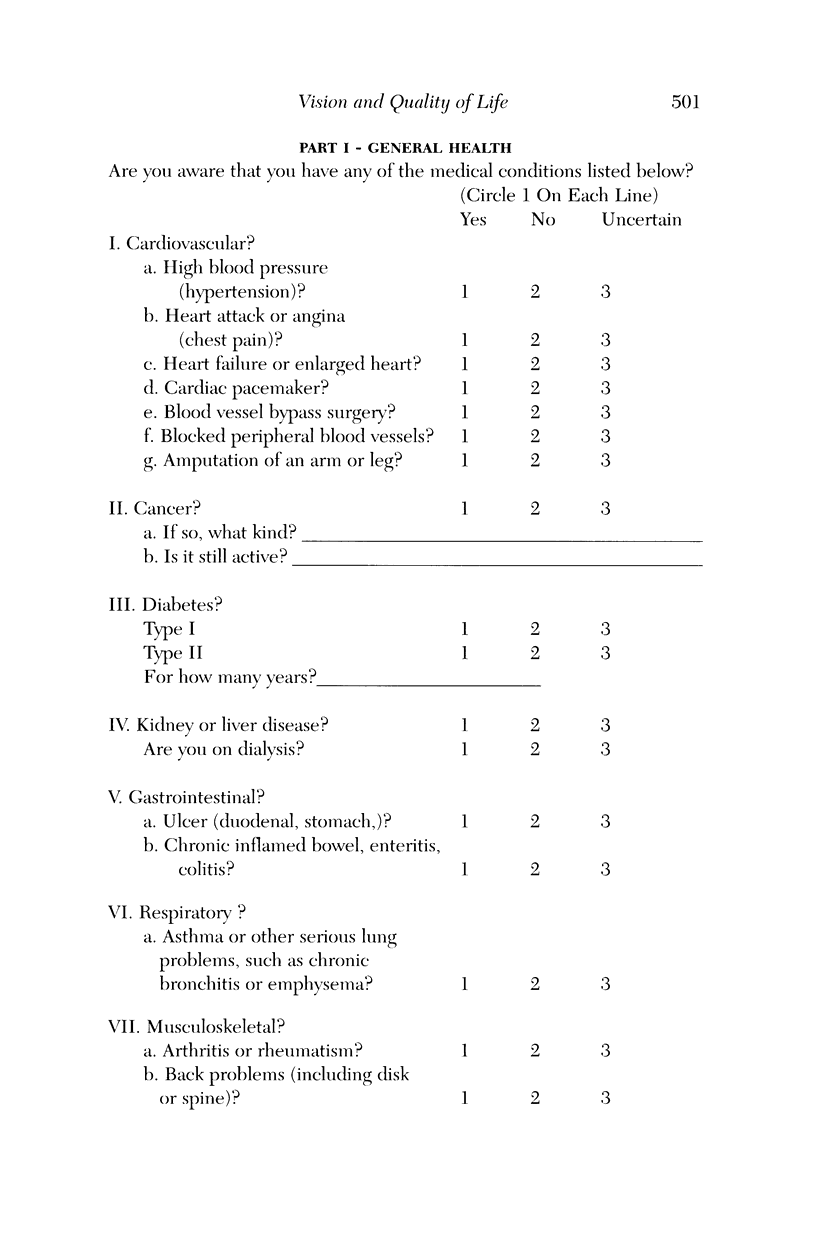
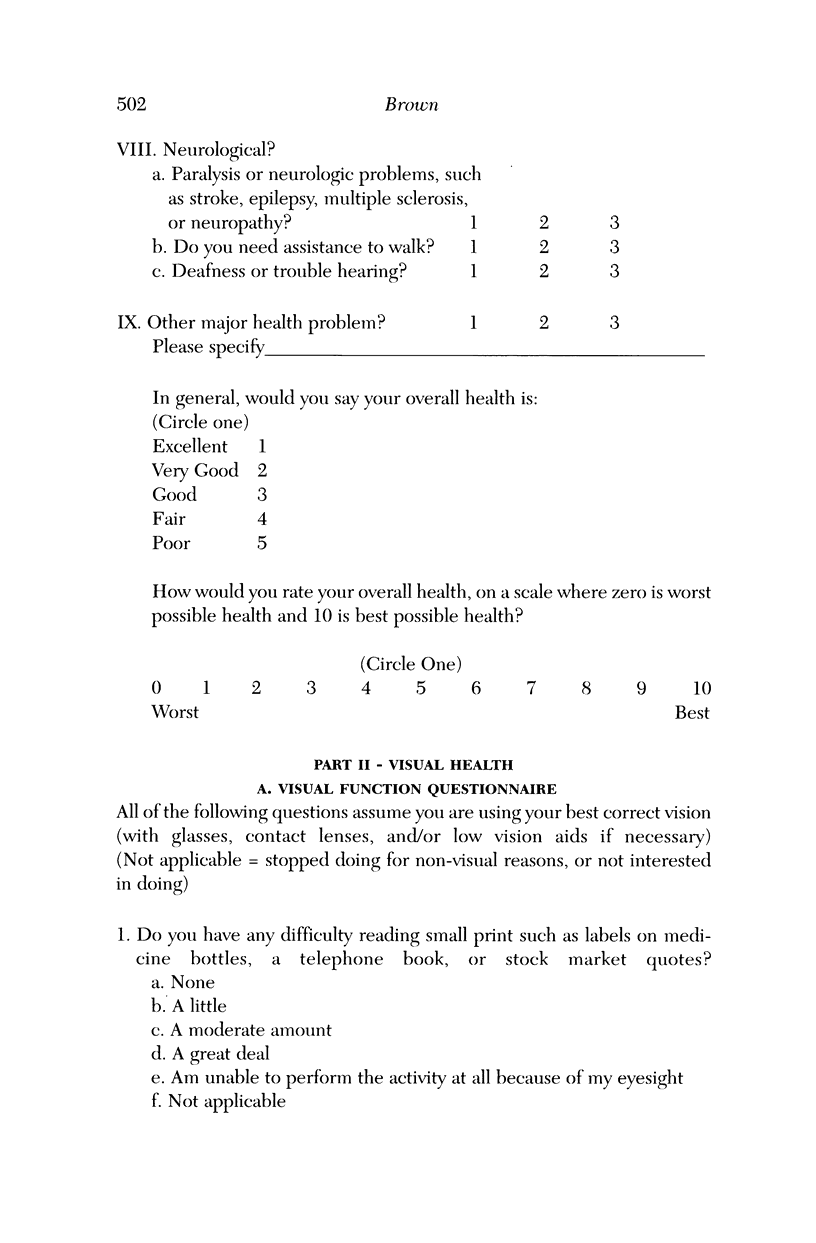
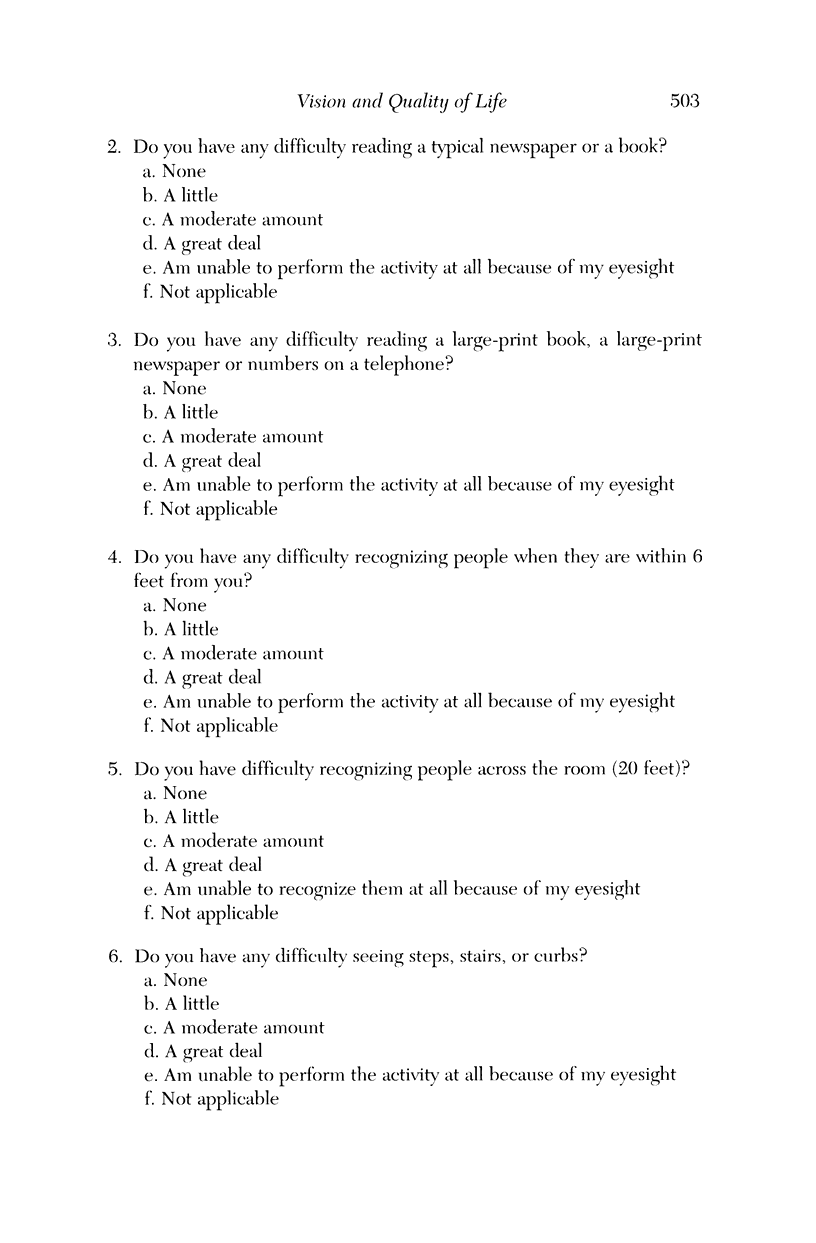
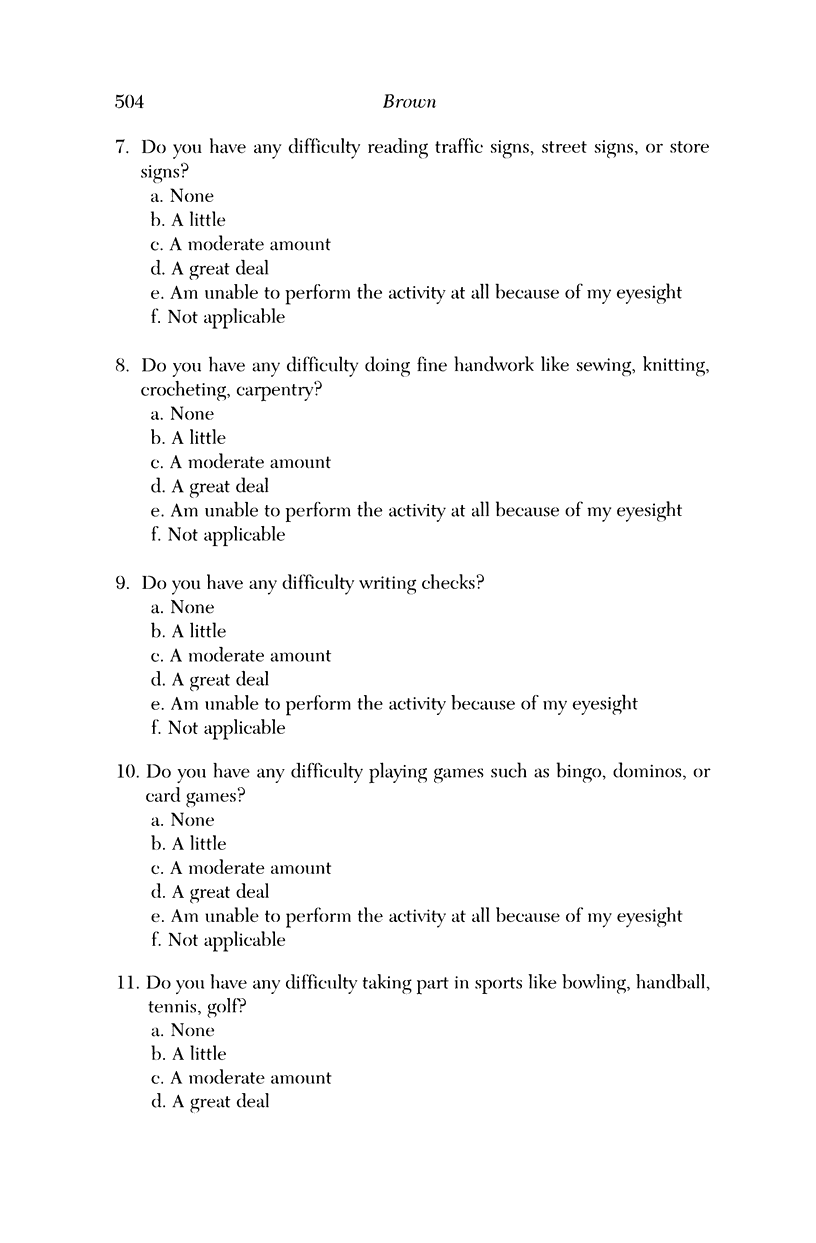
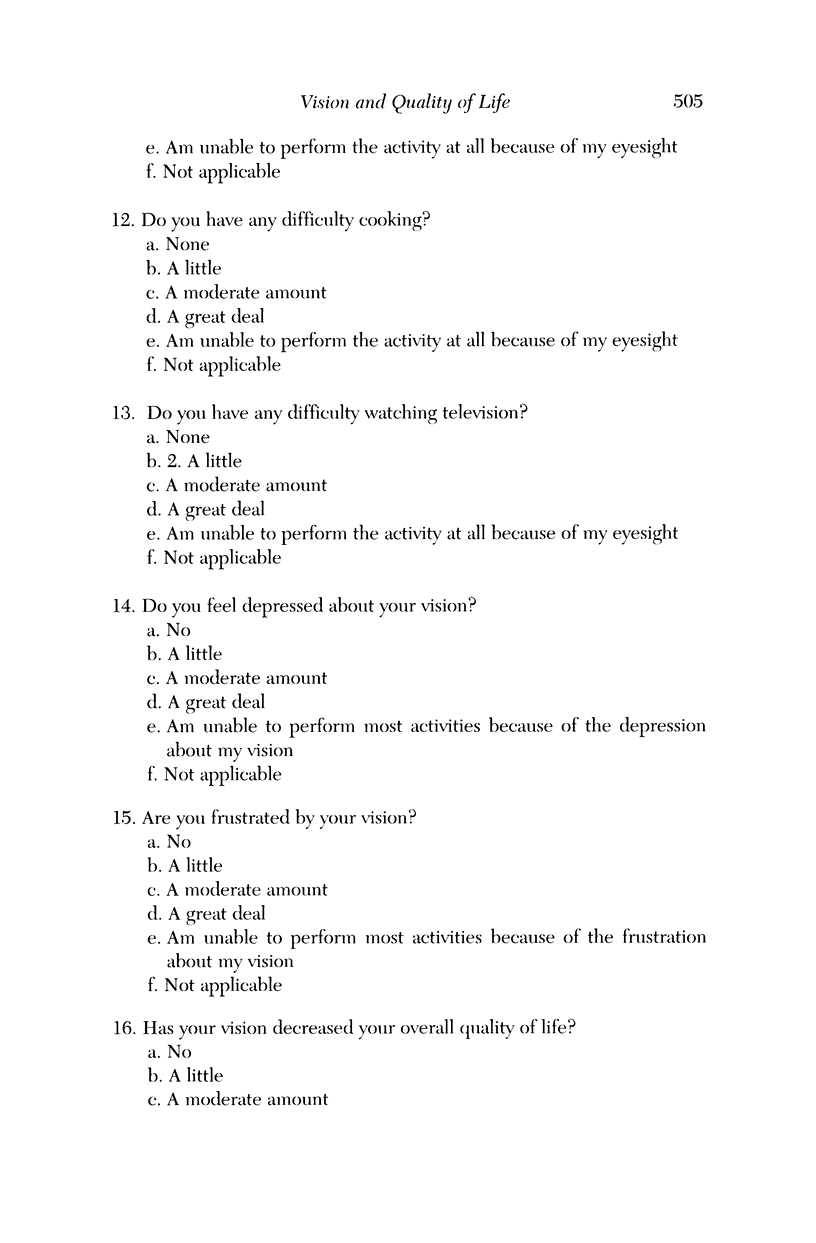
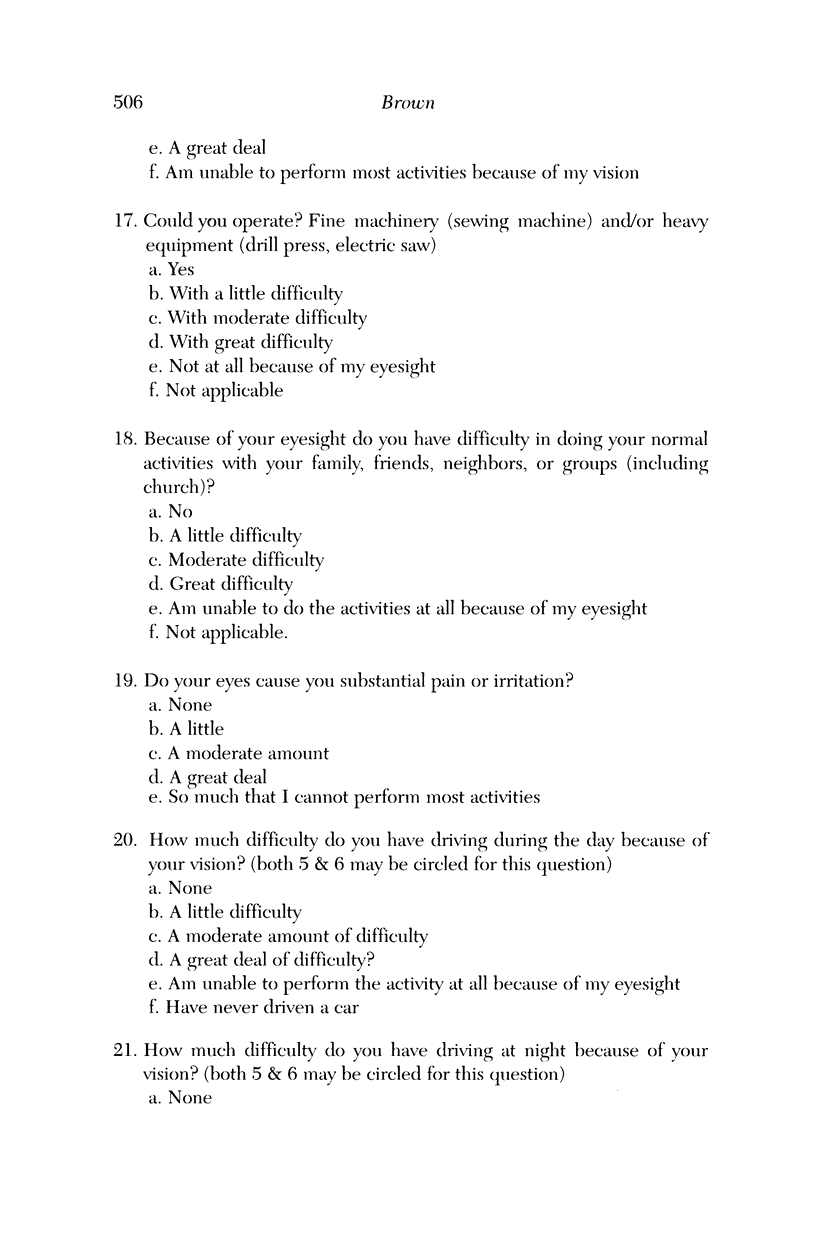
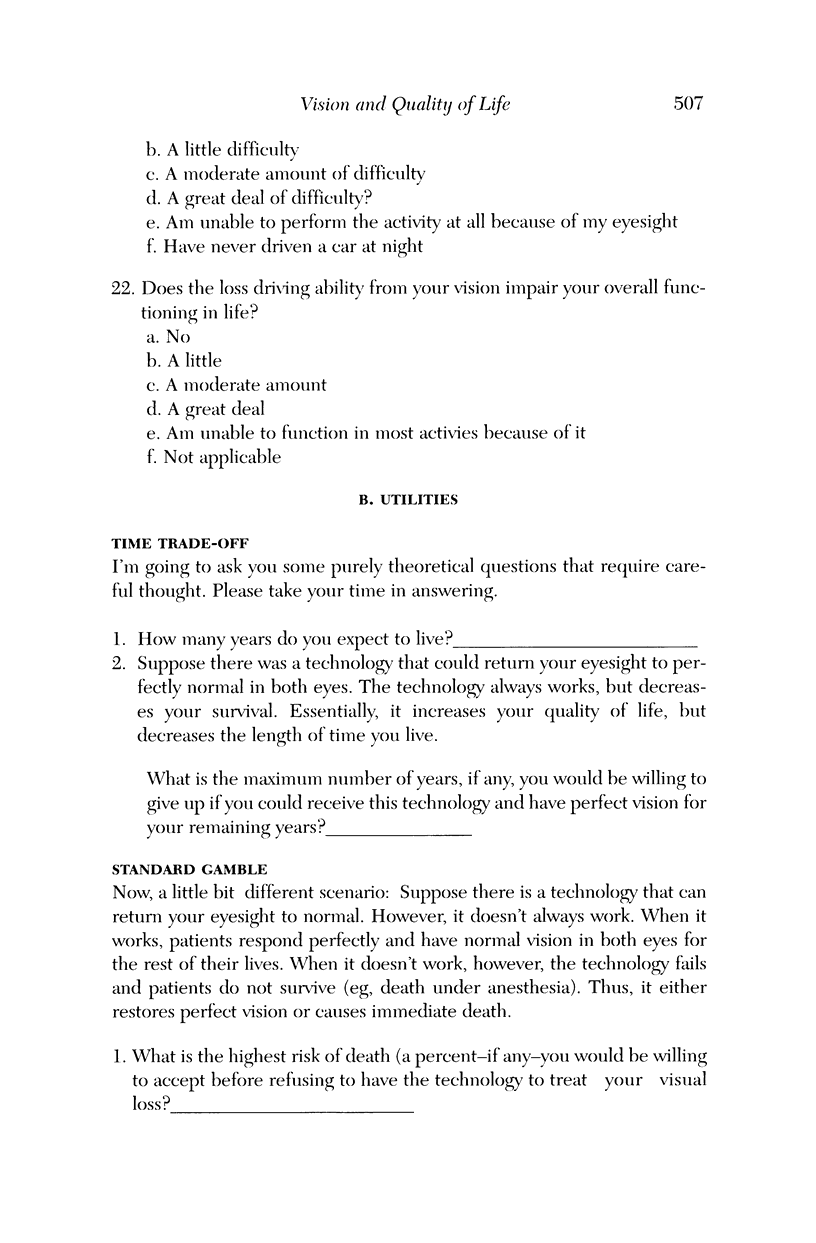
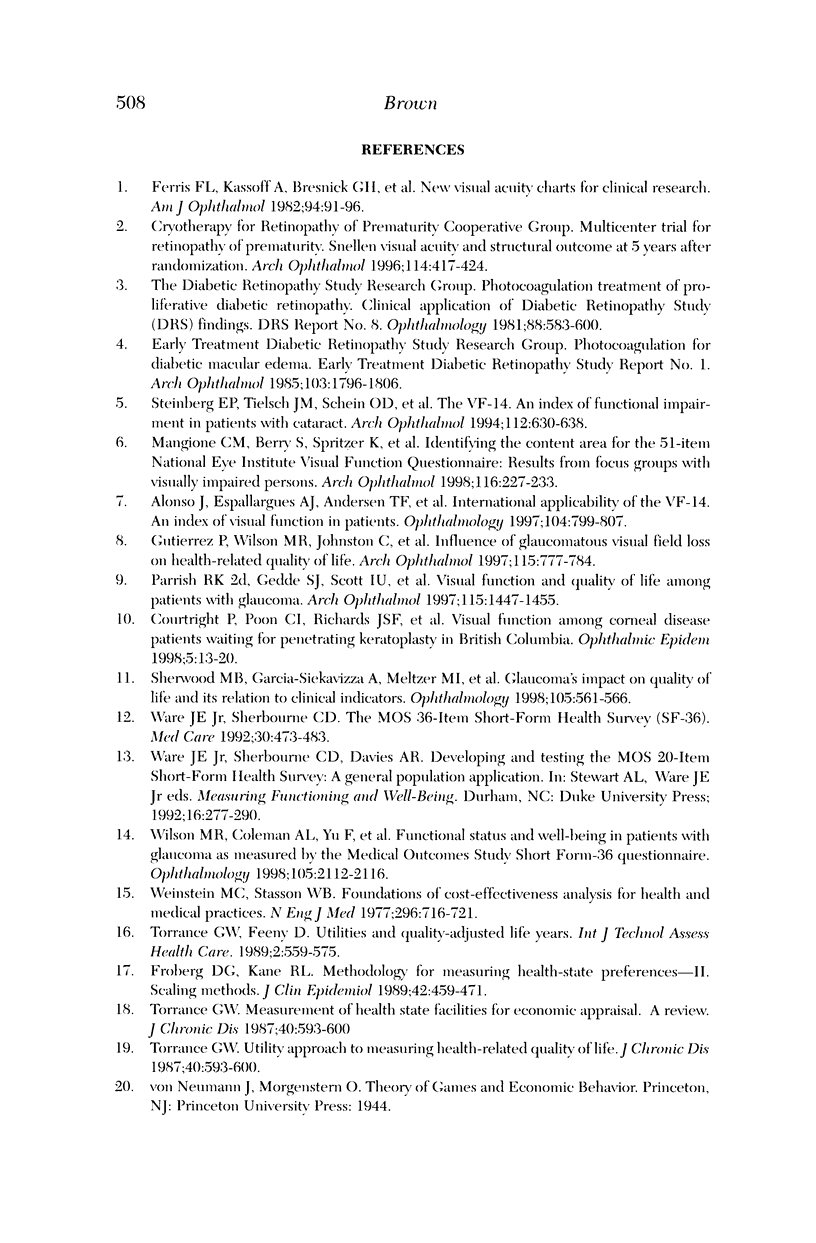
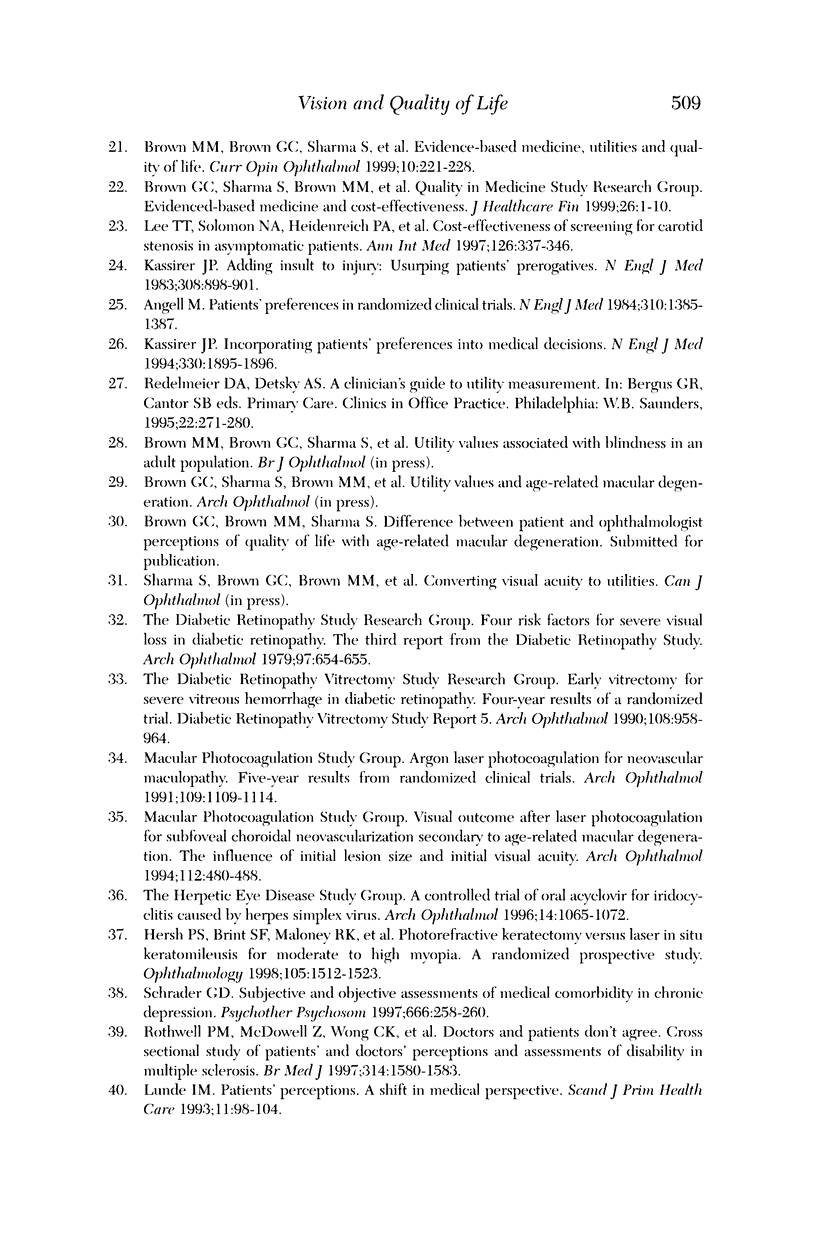
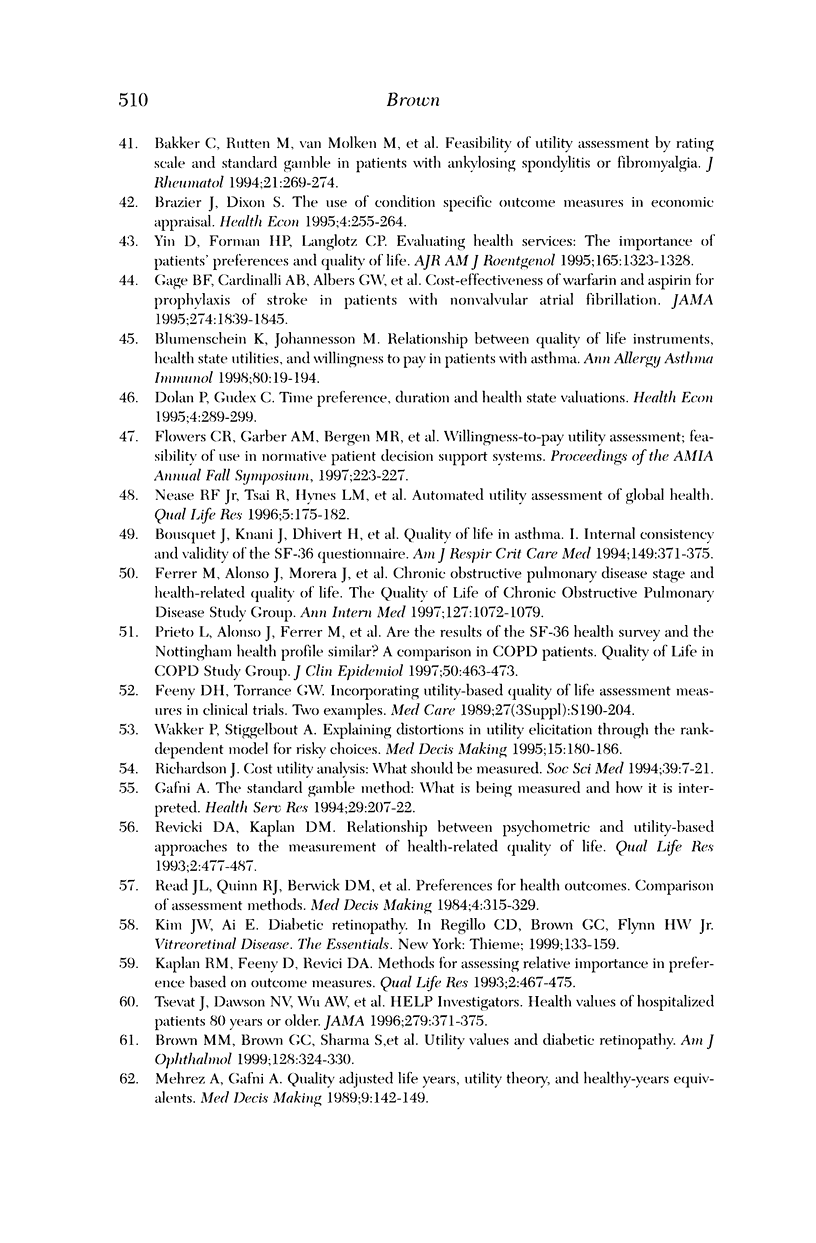
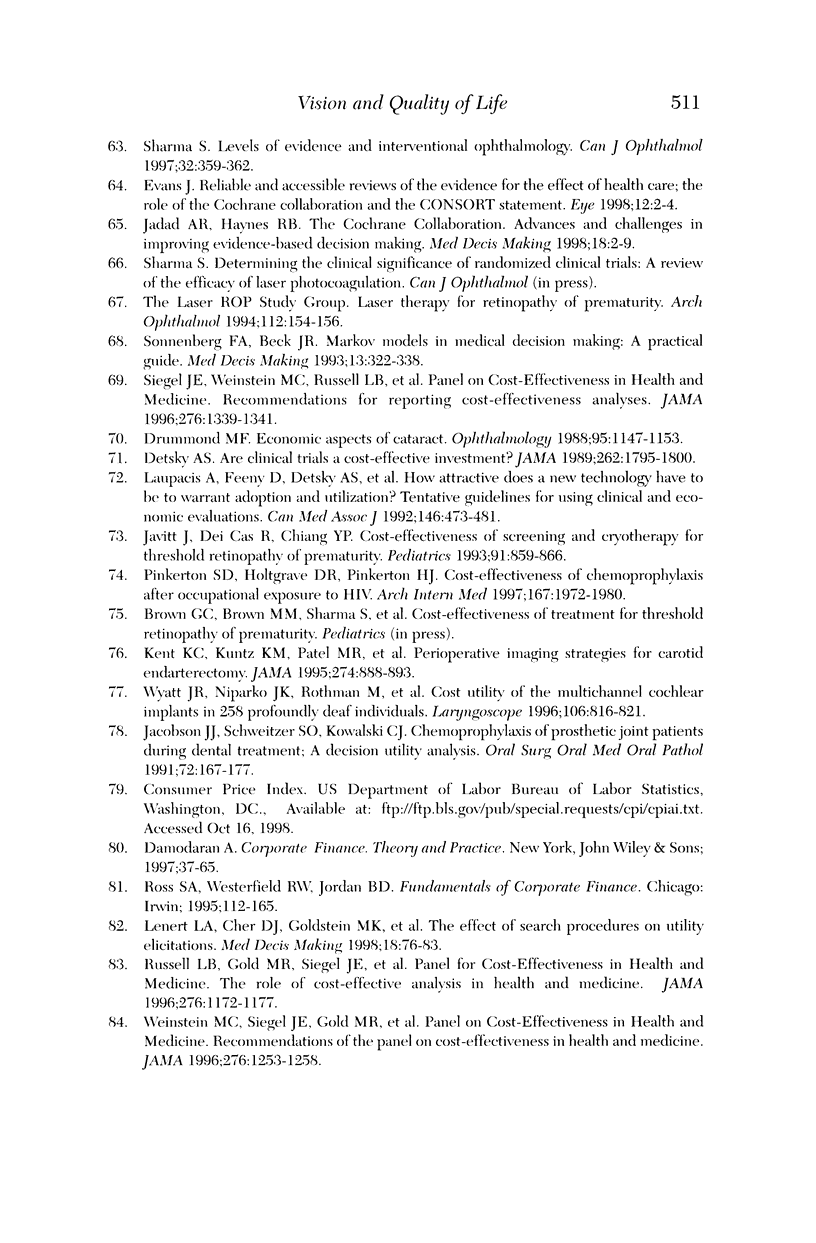
Selected References
These references are in PubMed. This may not be the complete list of references from this article.
- Alonso J., Espallargues M., Andersen T. F., Cassard S. D., Dunn E., Bernth-Petersen P., Norregaard J. C., Black C., Steinberg E. P., Anderson G. F. International applicability of the VF-14. An index of visual function in patients with cataracts. Ophthalmology. 1997 May;104(5):799–807. doi: 10.1016/s0161-6420(97)30230-9. [DOI] [PubMed] [Google Scholar]
- Bakker C., Rutten M., van Doorslaer E., Bennett K., van der Linden S. Feasibility of utility assessment by rating scale and standard gamble in patients with ankylosing spondylitis or fibromyalgia. J Rheumatol. 1994 Feb;21(2):269–274. [PubMed] [Google Scholar]
- Bousquet J., Knani J., Dhivert H., Richard A., Chicoye A., Ware J. E., Jr, Michel F. B. Quality of life in asthma. I. Internal consistency and validity of the SF-36 questionnaire. Am J Respir Crit Care Med. 1994 Feb;149(2 Pt 1):371–375. doi: 10.1164/ajrccm.149.2.8306032. [DOI] [PubMed] [Google Scholar]
- Brown M. M., Brown G. C., Sharma S., Garrett S. Evidence-based medicine, utilities, and quality of life. Curr Opin Ophthalmol. 1999 Jun;10(3):221–226. doi: 10.1097/00055735-199906000-00012. [DOI] [PubMed] [Google Scholar]
- Brown M. M., Brown G. C., Sharma S., Shah G. Utility values and diabetic retinopathy. Am J Ophthalmol. 1999 Sep;128(3):324–330. doi: 10.1016/s0002-9394(99)00146-4. [DOI] [PubMed] [Google Scholar]
- Courtright P., Poon C. I., Richards J. S., Chow D. L., Holland S. P. Visual function among corneal disease patients waiting for penetrating keratoplasty in British Columbia. Ophthalmic Epidemiol. 1998 Mar;5(1):13–20. doi: 10.1076/opep.5.1.13.1498. [DOI] [PubMed] [Google Scholar]
- Evans J. Reliable and accessible reviews of the evidence for the effect of health care: the role of the Cochrane Collaboration and the CONSORT statement. Eye (Lond) 1998;12(Pt 1):2–4. doi: 10.1038/eye.1998.2. [DOI] [PubMed] [Google Scholar]
- Ferrer M., Alonso J., Morera J., Marrades R. M., Khalaf A., Aguar M. C., Plaza V., Prieto L., Antó J. M. Chronic obstructive pulmonary disease stage and health-related quality of life. The Quality of Life of Chronic Obstructive Pulmonary Disease Study Group. Ann Intern Med. 1997 Dec 15;127(12):1072–1079. doi: 10.7326/0003-4819-127-12-199712150-00003. [DOI] [PubMed] [Google Scholar]
- Ferris F. L., 3rd, Kassoff A., Bresnick G. H., Bailey I. New visual acuity charts for clinical research. Am J Ophthalmol. 1982 Jul;94(1):91–96. [PubMed] [Google Scholar]
- Flowers C. R., Garber A. M., Bergen M. R., Lenert L. A. Willingness-to-pay utility assessment: feasibility of use in normative patient decision support systems. Proc AMIA Annu Fall Symp. 1997:223–227. [PMC free article] [PubMed] [Google Scholar]
- Froberg D. G., Kane R. L. Methodology for measuring health-state preferences--II: Scaling methods. J Clin Epidemiol. 1989;42(5):459–471. doi: 10.1016/0895-4356(89)90136-4. [DOI] [PubMed] [Google Scholar]
- Gage B. F., Cardinalli A. B., Albers G. W., Owens D. K. Cost-effectiveness of warfarin and aspirin for prophylaxis of stroke in patients with nonvalvular atrial fibrillation. JAMA. 1995 Dec 20;274(23):1839–1845. [PubMed] [Google Scholar]
- Gutierrez P., Wilson M. R., Johnson C., Gordon M., Cioffi G. A., Ritch R., Sherwood M., Meng K., Mangione C. M. Influence of glaucomatous visual field loss on health-related quality of life. Arch Ophthalmol. 1997 Jun;115(6):777–784. doi: 10.1001/archopht.1997.01100150779014. [DOI] [PubMed] [Google Scholar]
- Hersh P. S., Brint S. F., Maloney R. K., Durrie D. S., Gordon M., Michelson M. A., Thompson V. M., Berkeley R. B., Schein O. D., Steinert R. F. Photorefractive keratectomy versus laser in situ keratomileusis for moderate to high myopia. A randomized prospective study. Ophthalmology. 1998 Aug;105(8):1512-22, discussion 1522-3. doi: 10.1016/S0161-6420(98)98038-1. [DOI] [PubMed] [Google Scholar]
- Jacobson J. J., Schweitzer S. O., Kowalski C. J. Chemoprophylaxis of prosthetic joint patients during dental treatment: a decision-utility analysis. Oral Surg Oral Med Oral Pathol. 1991 Aug;72(2):167–177. doi: 10.1016/0030-4220(91)90159-a. [DOI] [PubMed] [Google Scholar]
- Jadad A. R., Haynes R. B. The Cochrane Collaboration--advances and challenges in improving evidence-based decision making. Med Decis Making. 1998 Jan-Mar;18(1):2–18. doi: 10.1177/0272989X9801800102. [DOI] [PubMed] [Google Scholar]
- Javitt J., Dei Cas R., Chiang Y. P. Cost-effectiveness of screening and cryotherapy for threshold retinopathy of prematurity. Pediatrics. 1993 May;91(5):859–866. [PubMed] [Google Scholar]
- Kaplan R. M., Feeny D., Revicki D. A. Methods for assessing relative importance in preference based outcome measures. Qual Life Res. 1993 Dec;2(6):467–475. doi: 10.1007/BF00422221. [DOI] [PubMed] [Google Scholar]
- Kassirer J. P. Adding insult to injury. Usurping patients' prerogatives. N Engl J Med. 1983 Apr 14;308(15):898–901. doi: 10.1056/NEJM198304143081511. [DOI] [PubMed] [Google Scholar]
- Kassirer J. P. Incorporating patients' preferences into medical decisions. N Engl J Med. 1994 Jun 30;330(26):1895–1896. doi: 10.1056/NEJM199406303302611. [DOI] [PubMed] [Google Scholar]
- Kent K. C., Kuntz K. M., Patel M. R., Kim D., Klufas R. A., Whittemore A. D., Polak J. F., Skillman J. J., Edelman R. R. Perioperative imaging strategies for carotid endarterectomy. An analysis of morbidity and cost-effectiveness in symptomatic patients. JAMA. 1995 Sep 20;274(11):888–893. doi: 10.1001/jama.274.11.888. [DOI] [PubMed] [Google Scholar]
- Laupacis A., Feeny D., Detsky A. S., Tugwell P. X. How attractive does a new technology have to be to warrant adoption and utilization? Tentative guidelines for using clinical and economic evaluations. CMAJ. 1992 Feb 15;146(4):473–481. [PMC free article] [PubMed] [Google Scholar]
- Lee T. T., Solomon N. A., Heidenreich P. A., Oehlert J., Garber A. M. Cost-effectiveness of screening for carotid stenosis in asymptomatic persons. Ann Intern Med. 1997 Mar 1;126(5):337–346. doi: 10.7326/0003-4819-126-5-199703010-00001. [DOI] [PubMed] [Google Scholar]
- Lenert L. A., Cher D. J., Goldstein M. K., Bergen M. R., Garber A. The effect of search procedures on utility elicitations. Med Decis Making. 1998 Jan-Mar;18(1):76–83. doi: 10.1177/0272989X9801800115. [DOI] [PubMed] [Google Scholar]
- Mangione C. M., Berry S., Spritzer K., Janz N. K., Klein R., Owsley C., Lee P. P. Identifying the content area for the 51-item National Eye Institute Visual Function Questionnaire: results from focus groups with visually impaired persons. Arch Ophthalmol. 1998 Feb;116(2):227–233. doi: 10.1001/archopht.116.2.227. [DOI] [PubMed] [Google Scholar]
- Mehrez A., Gafni A. Quality-adjusted life years, utility theory, and healthy-years equivalents. Med Decis Making. 1989 Apr-Jun;9(2):142–149. doi: 10.1177/0272989X8900900209. [DOI] [PubMed] [Google Scholar]
- Nease R. F., Jr, Tsai R., Hynes L. M., Littenberg B. Automated utility assessment of global health. Qual Life Res. 1996 Feb;5(1):175–182. doi: 10.1007/BF00435983. [DOI] [PubMed] [Google Scholar]
- Parrish R. K., 2nd, Gedde S. J., Scott I. U., Feuer W. J., Schiffman J. C., Mangione C. M., Montenegro-Piniella A. Visual function and quality of life among patients with glaucoma. Arch Ophthalmol. 1997 Nov;115(11):1447–1455. doi: 10.1001/archopht.1997.01100160617016. [DOI] [PubMed] [Google Scholar]
- Pinkerton S. D., Holtgrave D. R., Pinkerton H. J. Cost-effectiveness of chemoprophylaxis after occupational exposure to HIV. Arch Intern Med. 1997 Sep 22;157(17):1972–1980. [PubMed] [Google Scholar]
- Prieto L., Alonso J., Ferrer M., Antó J. M. Are results of the SF-36 health survey and the Nottingham Health Profile similar? A comparison in COPD patients. Quality of Life in COPD Study Group. J Clin Epidemiol. 1997 Apr;50(4):463–473. doi: 10.1016/s0895-4356(96)00420-9. [DOI] [PubMed] [Google Scholar]
- Read J. L., Quinn R. J., Berwick D. M., Fineberg H. V., Weinstein M. C. Preferences for health outcomes. Comparison of assessment methods. Med Decis Making. 1984;4(3):315–329. doi: 10.1177/0272989X8400400307. [DOI] [PubMed] [Google Scholar]
- Revicki D. A., Kaplan R. M. Relationship between psychometric and utility-based approaches to the measurement of health-related quality of life. Qual Life Res. 1993 Dec;2(6):477–487. doi: 10.1007/BF00422222. [DOI] [PubMed] [Google Scholar]
- Richardson J. Cost utility analysis: what should be measured? Soc Sci Med. 1994 Jul;39(1):7–21. doi: 10.1016/0277-9536(94)90162-7. [DOI] [PubMed] [Google Scholar]
- Russell L. B., Gold M. R., Siegel J. E., Daniels N., Weinstein M. C. The role of cost-effectiveness analysis in health and medicine. Panel on Cost-Effectiveness in Health and Medicine. JAMA. 1996 Oct 9;276(14):1172–1177. [PubMed] [Google Scholar]
- Sherwood M. B., Garcia-Siekavizza A., Meltzer M. I., Hebert A., Burns A. F., McGorray S. Glaucoma's impact on quality of life and its relation to clinical indicators. A pilot study. Ophthalmology. 1998 Mar;105(3):561–566. doi: 10.1016/S0161-6420(98)93043-3. [DOI] [PubMed] [Google Scholar]
- Siegel J. E., Weinstein M. C., Russell L. B., Gold M. R. Recommendations for reporting cost-effectiveness analyses. Panel on Cost-Effectiveness in Health and Medicine. JAMA. 1996 Oct 23;276(16):1339–1341. doi: 10.1001/jama.276.16.1339. [DOI] [PubMed] [Google Scholar]
- Sonnenberg F. A., Beck J. R. Markov models in medical decision making: a practical guide. Med Decis Making. 1993 Oct-Dec;13(4):322–338. doi: 10.1177/0272989X9301300409. [DOI] [PubMed] [Google Scholar]
- Steinberg E. P., Tielsch J. M., Schein O. D., Javitt J. C., Sharkey P., Cassard S. D., Legro M. W., Diener-West M., Bass E. B., Damiano A. M. The VF-14. An index of functional impairment in patients with cataract. Arch Ophthalmol. 1994 May;112(5):630–638. doi: 10.1001/archopht.1994.01090170074026. [DOI] [PubMed] [Google Scholar]
- Torrance G. W. Utility approach to measuring health-related quality of life. J Chronic Dis. 1987;40(6):593–603. doi: 10.1016/0021-9681(87)90019-1. [DOI] [PubMed] [Google Scholar]
- Tsevat J., Dawson N. V., Wu A. W., Lynn J., Soukup J. R., Cook E. F., Vidaillet H., Phillips R. S. Health values of hospitalized patients 80 years or older. HELP Investigators. Hospitalized Elderly Longitudinal Project. JAMA. 1998 Feb 4;279(5):371–375. doi: 10.1001/jama.279.5.371. [DOI] [PubMed] [Google Scholar]
- Wakker P., Stiggelbout A. Explaining distortions in utility elicitation through the rank-dependent model for risky choices. Med Decis Making. 1995 Apr-Jun;15(2):180–186. doi: 10.1177/0272989X9501500212. [DOI] [PubMed] [Google Scholar]
- Ware J. E., Jr, Sherbourne C. D. The MOS 36-item short-form health survey (SF-36). I. Conceptual framework and item selection. Med Care. 1992 Jun;30(6):473–483. [PubMed] [Google Scholar]
- Weinstein M. C., Siegel J. E., Gold M. R., Kamlet M. S., Russell L. B. Recommendations of the Panel on Cost-effectiveness in Health and Medicine. JAMA. 1996 Oct 16;276(15):1253–1258. [PubMed] [Google Scholar]
- Weinstein M. C., Stason W. B. Foundations of cost-effectiveness analysis for health and medical practices. N Engl J Med. 1977 Mar 31;296(13):716–721. doi: 10.1056/NEJM197703312961304. [DOI] [PubMed] [Google Scholar]
- Wyatt J. R., Niparko J. K., Rothman M., deLissovoy G. Cost utility of the multichannel cochlear implants in 258 profoundly deaf individuals. Laryngoscope. 1996 Jul;106(7):816–821. doi: 10.1097/00005537-199607000-00006. [DOI] [PubMed] [Google Scholar]
- Yin D., Forman H. P., Langlotz C. P. Evaluating health services: the importance of patients' preferences and quality of life. AJR Am J Roentgenol. 1995 Dec;165(6):1323–1328. doi: 10.2214/ajr.165.6.7484556. [DOI] [PubMed] [Google Scholar]


